
The Project Gutenberg EBook of The Pansy Magazine, January 1886, by Various This eBook is for the use of anyone anywhere at no cost and with almost no restrictions whatsoever. You may copy it, give it away or re-use it under the terms of the Project Gutenberg License included with this eBook or online at www.gutenberg.org Title: The Pansy Magazine, January 1886 Author: Various Editor: Pansy (Mrs. G. R. (Isabella) Alden) Release Date: March 31, 2014 [EBook #45266] Language: English Character set encoding: ISO-8859-1 *** START OF THIS PROJECT GUTENBERG EBOOK THE PANSY MAGAZINE, JANUARY 1886 *** Produced by Emmy, Juliet Sutherland and the Online Distributed Proofreading Team at http://www.pgdp.net

CANDY! | Send $1, $2, $3, or $5 for retail box by Express of the best Candies in America, put up in elegant boxes, and strictly pure. Suitable for presents. Express charges light. Refers to all Chicago. Try it once.
Address C. F. GUNTHER, Confectioner, Chicago. |
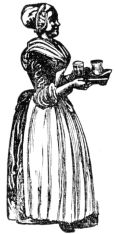
|
GOLD MEDAL, PARIS, 1878.
BAKER'S Breakfast Cocoa. Warranted absolutely pure Cocoa, from which the excess of Oil has been removed. It has three times the strength of Cocoa mixed with Starch, Arrowroot or Sugar, and is therefore far more economical, costing less than one cent a cup. It is delicious, nourishing, strengthening, easily digested, and admirably adapted for invalids as well as for persons in health.
——————
Sold by Grocers everywhere. ——————
W. BAKER & CO., Dorchester, Mass.
|
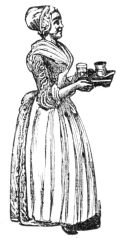
|
GOLD MEDAL, PARIS, 1878.
BAKER'S Vanilla Chocolate, Like all our chocolates, is prepared
with the greatest care, and
consists of a superior quality of
cocoa and sugar, flavored with
pure vanilla bean. Served as a
drink, or eaten dry as confectionery,
it is a delicious article,
and is highly recommended by
tourists.
——————
Sold by Grocers everywhere. ——————
W. BAKER & CO., Dorchester, Mass.
|
| BRIGGS' | Transfer Patterns. Catalogue 25c. Price lists free. J. F. INGALLS, Lynn, Mass. |
| 50 | Chromo & hidden name cards, the Love telegraph & outfit 10c., 6 lots, 50c. O. A. Brainard, Higganum, Ct. |
| FREE | Our New Book, just out, entitled, "DRESS REFORM FOR LADIES, or The Absurdity of the Custom of Tight Lacing, as well as its effect upon the Health of Slaves to the Fashion." Illustrated. Sent FREE (to Ladies only) on receipt of two 2-cent stamps to pay postage. SCHIELE & CO., 390 Broadway, New York. |

| Fancy Work | BOOKS, Stamping Outfits, Fancy Work Materials, etc. |
| Ingalls' Manual of Fancy Work, new edition, | Price 36c. |
| Colors of Flowers for Embroidery | 35c. |
| Handbook of Crochet and Knitted Lace | 30c. |
| Book of Darned Lace Patterns | 25c. |
| Book for Crazy Patchwork | 15c. |
| Macrame Lace and Rick-Rack Book | 15c. |
| Book of Worsted Cross-Stitch Patterns | 25c. |
| Book of Tidy and Point-Russe Patterns | 25c. |
| Instruction Book for Stamping and Painting | 15c. |
SPECIAL OFFER!—We will send you these 9 Books by mail, for $1.00 and five 2c. stamps.
New Stamping Outfit, containing Alphabet (26 letters), 47 Stamping Patterns, Box Powder, Pad, a Felt Tidy; Imported Silk to work it, Instruction Book and Big Catalogue (mentioned above). Price $1.00.
YOU CAN DYE | ANYTHING ANY COLOR |
| 50 | Hidden name & chromos, 5 birthday cards & holiday gift, 10c., 6 lots, 50c. Empire Co., Higganum, Ct. |
BEFORE YOU BUY A BICYCLE
Of any kind, send stamp to A. W. GUMP.,
Dayton, Ohio, for large Illustrated Price
List of New and Second-Hand Machines.
Second-hand BICYCLES taken in exchange. |
We guarantee everything strictly as represented, or the money will be refunded. The Yankee Blade has been published every week for 45 years, and as to our responsibility we refer to any publisher in the city of Boston.
Fret and Scroll Sawing, Turning, Boring, Drilling, Grinding, Polishing, Screw Cutting. Price $5 to $50. Send 6 cents for 100 pages.
Use "Our Trade Mark" Hams and Boneless Bacon.

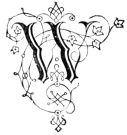
"We would like to send it to the fisherman's children down the coast; Janet, you know, and all her children; Daniel told us all about them." This was the verdict of both Celia and Annie, and to it they clung, in the face of all objections in the shape of not knowing what they needed, or how they would receive a gift. "They need everything, mamma; if you had seen them, you would know. And of course they will like it; who wouldn't like to have a Christmas box?" So the box went its way.
It was delayed, as boxes are apt to be, so it was Christmas morning when it reached the desolate little home where Janet lived. It was very desolate that day; and Janet who did not often lose her courage, had given up and cried. No work, and hungry mouths and worn-out clothes. That was the whole sad story. Positively, Christmas day as it was, there was not a mouthful in that house to eat! They had had some breakfast, but where the dinner was to come from none of them knew. The father, after sitting with his head leaning on his hands for awhile, had risen up very slowly as though he had grown old in a few hours, and said: "If worse comes to worst I can go to Daniel at the hotel and ask him for some cold pieces; but I do hate to beg."
Then he went out, to take one more look through the dreary little village in search of work. It was then the express wagon stopped at the door, and a great box was carried in. "Janet Burns" was the name in heavy black letters on the box. It was a work of time to get it open. The hammer, axe, an old file and a big old knife each had to be tried in turn. But at last it was open and the treasures began to come out.
Oh! the wonders of that box. Two plump fat chickens bearing in their breasts a card on which was written: "We are cooked all ready to be eaten; or, if you like us hot, just plump us into the oven a few minutes, for it is a cold day and we have come fifty miles by train."
A beautiful ham which had another card: "I'm boiled, and am very good eaten cold." A bag of potatoes which said: "We are not cooked, but if you will wash our coats and put us in your oven you will see how fast we will get ready for dinner." So, through the box. There were two pies, and a cake full of raisins, and a bag of nuts and candies. And there was a package over which Janet cried for joy; she had laughed about all the rest; but this had warm flannels, and three dresses for the baby; and two suits almost as good as new for the little girls; and a woollen blanket for father's bed, and could it be! Yes, there was a new dress for herself; besides this, there were stockings and shoes, and two flannel sacks, and I really have not time to tell you what else. But pinned into a corner of a pretty handkerchief which had Janet's name on it, was a shining bit of gold worth five dollars! Can you imagine Mr. Burns' face when he came back with a loaf of bread he had earned, not begged, a bit of dried beef, and found the table set, a chicken before his plate, flanked by a dish of potatoes in such a hurry to be eaten every one burst through their coats? All the talk there was during the next hour, would make a book in itself.
"And you ain't no notion where they came from?" he asked for the third or fourth time.
"Not the least in the world. One card says: 'From Santa Claus, to the little girl who takes good care of her brothers and sisters;' but who knows whether I take good care of them or not?"
"I suspect the Lord does," said Joseph Burns reverently, "and He has told some of his children to send you a Christmas box. We must thank the Lord, and trust to Him to pay the others. He will do it." But I cannot help thinking, what if Janet had been cross that windy day!
He did that which was right in the sight of the lord.
The harvest is past, the summer is ended, and we are not saved.
For unto this day they drink none, but obey their father's commandment.
By the rivers of Babylon, there we sat down, yea, we wept when we remembered Zion.
"Let's hear it right away, if you please," Ralph said, and the others settled into quiet as soon as possible.
"It wasn't so very many years ago, not more than fifty-five," began Grandma, and then Rollo nudged Harold, and chuckled; and Marion looked with grave astonished eyes at a woman who thought fifty-five years was not a long, long time! But Grandma took no notice of them.
"Yes," she said, "it is just about fifty-five years ago. There was a pretty little boy whom I knew; he had yellow hair, and the bluest eyes, and he was a dear bright little fellow. One day he went visiting out to a nice old lady's who lived near his father's old place. While he was there, who should come along but two trim little girls who were out getting signers to the Total Abstinence Pledge. We called it the tetotal pledge in those days. There was quite an excitement about it in town. A man lectured every evening, and had meetings for the children afternoons, and gave them each pledge books, and the one who got the greatest number of signers was to have a medal with his name on. It wasn't a gold medal, but it shone, and had a nice blue ribbon to put around your neck; and the children all liked it.
"Well, these two came to aunt Patty's door and asked for signers. Aunt Patty invited them in and got out her quill pen which wasn't used very often, and she and her oldest girl, Prudence, put down their names. The little fellow stood looking on; he wasn't four years old yet, but he lived where he saw a great deal of writing going on, and behold he wanted to sign his name. Aunt Patty laughed, and tried to explain to him that he was too young; but he said No, he "writed" his name once when "favver" held his hand, and he wanted to do it again. That was true enough. One day his father bought him a picture book, and guided the pencil in his hand and let him put his name in it. After a good deal of coaxing, aunt Patty sat down and took him in her lap, and held that old quill, guiding it as well as she could, and he did get what looked something like his name in the book. It was very queer writing," said Grandma, stopping to laugh at the thought of it, with that same tender look in her eyes, "but the little fellow was just as proud of it as could be. He told of it the first thing when he went home, but his mother—oh! you don't know how badly she felt."
"Why?" interrupted Marion and Rollo. "Wasn't she a good mother?" asked Marion. "Didn't she believe in temperance?" asked Rollo.
"O, yes, she believed in temperance; but she had some very strong notions about promises. She wanted her little boy to understand all about it whenever he made one, and then to keep it as he would the eighth commandment; and she said he was too young to take a pledge, that he could not understand what it meant, and he would think that signing his name to a paper was a light thing, just for play. Why, children, she felt so badly about it that she just sat down and cried."
"Ho!" said Rollo, "I think she was foolish. I dare say he understood."
"Go on, Grandma," said Marion.
"Well, while the mother was crying, the father came home, and wanted to know all about it; and he thought as Rollo does, that the boy understood, or could be made to. He took him on his knee and they had a long talk all about drinking; what a dreadful thing it was, and about pledges, and then what should he tell him but this old story of the Rechabites; how they kept the promise made to their father, never forgetting it once; and how God was pleased, and rewarded them. Then he made the little fellow hold up his hand and say after him: 'Unto this day they drink none, but obey their father's commandment.' Then he explained that the paper the child had signed was a promise that[68] he would obey his father's command and never touch liquor. 'I won't, favver,' the boy said; 'I'll 'member.' And he looked very earnest. But in two or three minutes he was playing with the cat; and his mother couldn't feel that he really understood much about it.
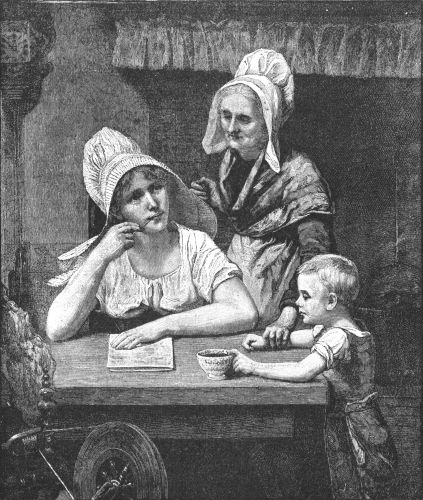
"It was three years afterwards, and the little boy was seven years old—a beautiful child. One winter his mother was very sick, every one thought she would die; she was so low that she didn't know her own little boy, and she couldn't bear the least noise; so her boy was taken to his auntie's, and stayed there for weeks. One evening he was in the parlor with his uncle, there were three or four gentlemen there, and pretty soon cider was brought in. The little boy sat beside a gentleman who offered him a drink of cider from his glass; the boy refused politely; and the gentleman thinking he was timid, coaxed him. Then his uncle spoke up: 'That young man has never tasted cider, he tells me.' At this they all laughed; it was a very unusual thing in those days to find a child seven years old who had never tasted cider; it sounded almost as strange as it would to say now that one had never tasted water.
"The gentleman said that accounted for his not wanting some; that he did not know how good it was; so he urged him to just try a swallow, and kept coaxing until at last his uncle said, 'Try it, my boy; if you don't like it you need not take any more.' 'No, sir,' the boy said, 'I don't want to try it!' Well, then his uncle thought he was rude and disobedient and ought to be made to mind; so[69] he said: 'I command you to take a swallow of it, my boy, and I am to be obeyed, you know.' What did that little seven-year-old baby do but get up in the middle of the floor, with his eyes flashing, and his cheeks glowing, and shout out in a loud strong voice: '"Unto this day they drink none, but obey their father's commandment," and I don't either. I promised, I did; and I never will; not if you whip me to death.' Then he burst out crying, and ran out of the room."
"Good for him!" said Rollo.
"Oh, hurrah!" said Harold.
"I am so glad!" said Marion. "I wonder what his mother thought then, if she ever heard of it. Did she get well, Grandma?"
"Yes, she got well; and was a proud and happy mother when she heard the story. But that is only the beginning of it. I saw that boy when he was a young man and came home from college as handsome as a picture, and I heard his father say to him: 'Well, my boy, they tell me most of the young men use liquor more or less; how do you get on with them?'
"And he looked around with his bright laughing eyes and said:
"'I'm all right, father; to this day I drink none, but obey my father's commandment. That pledge of mine ought to be printed in gold on my tombstone when I die, for it has held me in the midst of many temptations.'
"And there his mother thought he was too young to understand!"
And Grandma Burton actually wiped the tears from her eyes, though she was smiling yet.
"Grandma," said Marion, "what was that boy's name? You haven't spoken his name once."
"I guess something," said Ralph eagerly. "Wasn't his name Mott, Grandma?"
"Robert Mott Burton, that was his name, my darlings."
"Our own uncle Mott!" said astonished little Sarah.
"Then that's what makes him such a red-hot temperance man now, isn't it?" said Rollo. "Didn't he begin early, though?"
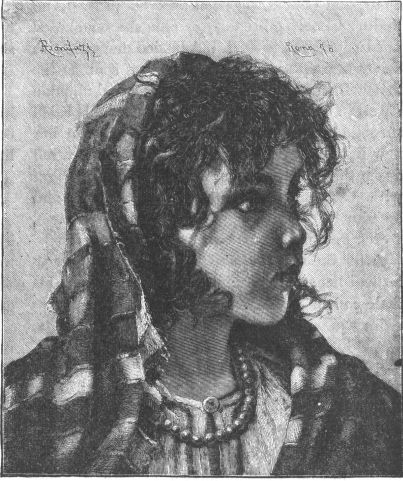

"O, how nice! your grate burns lovely."
After the new hat, necklace and bangle bracelet had been duly admired, Tom and Gracie, his little cousin, sat down in the great arm chair to enjoy the bright fire and have one of their chats.
"Who are you going to make happy to-day?"
"Me? How can I make anybody happy?"
Tom smiled as he replied, "Do you not know that you make us all happy, just by being here?"
"O, I thought you meant something different."
"So I did, little one. There are a great many people in this city who have very little to make them happy, and you and I who have so much may make at least one heart joyful on this glad Christmas day, do you not think so?"
"If I knew how," said Gracie.
"We will try to find a way. I see you are quite dressed up this morning," referring to the dressing-gown. "Do you see my new one?"
"Yes; you are the one that is dressed up."
"I know a poor invalid to whom I mean to give the old one, and there is a little girl who has not a comfortable dress nor a pair of shoes."
"Nor any nice hat and bracelet?"
"No, I doubt if she has any hat or even a hood. I saw her out with an old shawl over her head."
Just then the second bell rang and Gracie was obliged to go and get ready for breakfast. Other surprises awaited her, but she was unusually thoughtful, and at last Louise said, "Gracie, what makes you so sober? Are you not satisfied?"
"O, yes; but I am thinking what I can give to a little girl who has nothing to make her happy to-day."
"I don't believe there are any such people," said Louise; "everybody manages to get about so much out of something, I guess. They may not have just what we have, but there's something."
"Do you believe that?" asked cousin Tom.
"Maybe not exactly, but there's no use in making a child like Gracie miserable over what she can't help," replied Louise, in a low tone.
"But she can help a little."
"I am going to help," said Gracie earnestly, having caught the drift of Tom's question. "I have made up my mind what I shall send the little girl cousin Tom told me about."
"Suppose I should take you to see her?"
"I should like that! If mamma will let me go."
"I think she will. Auntie, will you let me have Gracie for an hour this morning? I will take good care of her."
"O, mamma!" expostulated Louise, "he is going to take her among his poor people! She will be sure to get a fever or something!"
"I am going to take you, too," said Tom; "and I am not going to take either of you into any dangerous places."
Louise arched her eyebrows as she replied, "Going to take me! We'll see." But she went. She generally did whatever Tom suggested.
I am not certain whether it was the package of warm clothing, the basket containing the Christmas dinner, the toys which Gracie had packed, not forgetting a bead necklace, or the presence of the beautiful child and lovely young lady in that home, that brought the most of happiness upon that Christmas day to the sad heart of Karl Ritter and his lonely little girl. But this I do know, that the visitors carried away as much happiness as they brought, for Gracie declared it was the nicest Christmas she had ever spent, and even Louise confessed that there was a new joy in her heart that day, for she had tested the truth, "It is more blessed to give than to receive."
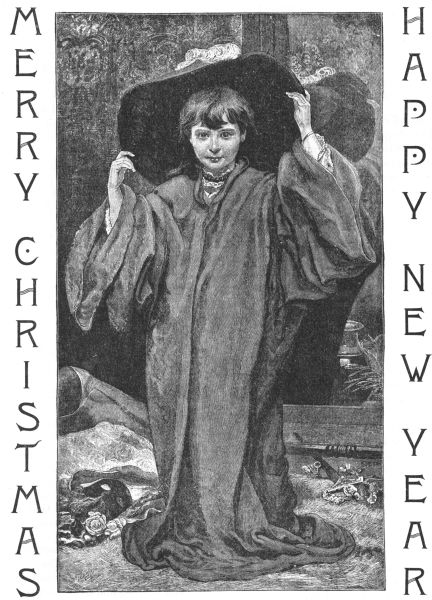
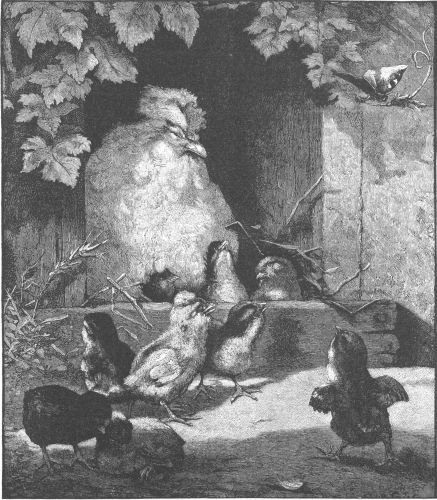

This, Jerry said, as he sat on the side step with Nettie, after sunset. They had been having a long talk, planning the campaign against the enemy, which they had made up their minds should be carried on with vigor. At least, they had been trying to plan; but that obstacle which seems to delight to step into the midst of so many plans and overturn them, viz. money, met them at every point. So when Jerry made that emphatic announcement, Nettie was prepared to agree with him fully; but none the less did she turn anxious eyes on him as she said:
"How can we?"
"I don't know yet," Jerry said, whistling a few bars of
Oh, do not be discouraged,
and stopping in the middle of the line to answer, "But of course there is a way. There was an old man who worked for my father, who used to say so often: 'Where there's a will there's a way,' that after awhile we boys got to calling him 'Will and Way' for short, you know; his name was John," and here Jerry stopped to laugh a little over that method of shortening a name; "but it was wonderful to see how true it proved; he would make out to do the most surprising things that even my father thought sometimes could not be done. We must make a way to earn some money."
Nettie laughed a little. "Well, I am sure," she said, "there is a will in this case; in fact, there are two wills; for you seem to have a large one, and I know if ever I was determined to do a thing I am now; but for all that I can't think of a possible way to earn a cent."
Now Sarah Ann Smith was at this moment standing by the kitchen window, looking out on the two schemers. Her sleeves were rolled above her elbow, for she was about to set the sponge for bread; she had her large neat work apron tied over her neat dress-up calico; and on her head was perched the frame out of which, with Nettie's skilful help, and some pieces of lace from her mother's old treasure bag, she meant to make herself a bonnet every bit as pretty as the one worn by Miss Sherrill the Sabbath before.
"Talk of keeping things seven years and they'll come good," said Mrs. Smith, watching with satisfaction while Nettie tumbled over the contents of the bag in eager haste and exclaimed over this and that piece which would be "just lovely." "I've kept the rubbish in that bag going on to twenty years, just because the pretty girls where I used to do clear-starching, gave them to me. I had no kind of notion what I should ever do with them; but they looked bright and pretty, and I always was a master hand for bright colors, and so whenever they would hand out a bit of ribbon or lace, and say, 'Cerinthy, do you want that?' I was sure to say I did; and chuck it into this bag; and now to think after keeping of them for more than twenty years, my girl should be planning to make a bonnet out of them! Things is queer! I don't ever mean to throw away anything. I never was much at throwing away; now that's a fact."
Now the truth was that Sarah Ann, left to herself, would as soon have thought of making a house out of the contents of that bag, as a bonnet; but Nettie Decker's deft fingers had a natural tact for all cunning contrivances in lace and silk, and her skill in copying what she saw, was something before which Sarah Ann stood in silent admiration; when, therefore, she offered to construct for Sarah Ann, out of the treasures of that bag, a bonnet which should be both becoming and economical, Sarah Ann's gratitude knew no bounds. She went that very afternoon to the milliner's to select her frame, and had it perched at that moment as I said, on her head, while she listened to the clear young voices under the window. She had a great desire to be helpful; but money was far from plenty at Job Smith's.
What was it which made her at that moment think of a bit of news which she had heard while at the milliner's? Why, nothing more remarkable than that the color of Nettie Decker's hair[75] in the fading light was just the same as Mantie Horton's. But what made her suddenly speak her bit of news, interrupting the young planners? Ah, that Sarah Ann does not know; she only knows she felt just like saying it, so she said it.
"Mantie Horton's folks are all going to move to the city; they are selling off lots of things; I saw her this afternoon when I was at the milliner's, and she says about the only thing now that they don't know what to do with is her old hen and chickens; a nice lot of chicks as ever she saw, but of course they can't take them to the city. My! I should think they would feel dreadful lonesome without chickens, nor pigs, nor nothing! We might have some chickens as well as not, if we only had a place to keep 'em; enough scrapings come from the table every day, to feed 'em, most."
Before this sentence was concluded, Jerry had turned and given Nettie a sudden look as if to ask if she saw what he did; then he whistled a low strain which had in it a note of triumph; and the moment Sarah Ann paused for breath he asked: "Where do the Hortons live?"
"Why, out on the pike about a mile; that nice white house set back from the road a piece; don't you know? It is just a pleasant walk out there."
Then Sarah Ann turned away to attend to her bread, and as she did so her somewhat homely face was lighted by a smile; for an idea had just dawned upon her, and she chuckled over it: "I shouldn't wonder if those young things would go into business; he's got contrivance enough to make a coop, any day, and mother would let them have the scrapings, and welcome."
Sarah Ann was right; though Nettie, unused to country ways and plans, did not think of such a thing, Jerry did. The next morning he was up, even before the sun; in fact that luminary peeped at him just as he was turning into the long carriage drive which led finally to the Horton barnyard. There a beautiful sight met his eyes; a white and yellow topknot mother, and eight or ten fluffy chickens scampering about her. "They are nice and plump," said Jerry to himself; "I'm afraid I haven't money enough to buy them; but then, there is a great deal of risk in raising a brood of chickens like these; perhaps he will sell them cheap."
Farmer Horton was an early riser, and was busy about his stables when Jerry reached there. He was anxious to get rid of all his live stock, and be away as soon as possible, and here was a customer anxious to buy; so in much less time than Jerry had supposed it would take, the hen and chickens changed owners and much whistling was done by the new owner as he walked rapidly back to town to build a house for his family.
Mrs. Smith had been taken into confidence; so indeed had Job, before the purchase was made; but the whole thing was to be a profound surprise to Nettie. Therefore, she saw little of him that day, and I will not deny was a trifle hurt because he kept himself so busy about something which he did not share with her. But I want you to imagine, if you can, her surprise the next morning when just as she was ready to set the potatoes to frying, she heard Jerry's eager voice calling her to come and see his house.
"See what?" asked Nettie, appearing in the doorway, coffee pot in hand.
"A new house. I built it yesterday, and rented it; the family moved in last night. That is the reason I was so busy. I had to go out and help move them; and I must say they were as ill-behaved a set as I ever had anything to do with. The mother is the crossest party I ever saw; and she has no government whatever; her children scurry around just where they please."
"What are you talking about?" said astonished Nettie, her face growing more and more bewildered as he continued his merry description.
"Come out and see. It is a new house, I tell you; I built it yesterday; that is the reason I did not come to help you about the bonnet. Didn't you miss me? Sarah Ann thinks it is actually nicer than the one Miss Sherrill wore." And he broke into a merry laugh, checking himself to urge Nettie once more to come out and see his treasures.
"Well," said Nettie, "wait until I cover the potatoes, and set the teakettle off." This done she went in haste and eagerness to discover what was taking place behind Job Smith's barn. A hen and chickens! Beautiful little yellow darlings, racing about as though they were crazy;[76] and a speckled mother clucking after them in a dignified way, pretending to have authority over them, when one could see at a glance that they did exactly as they pleased.
Then came a storm of questions. "Where? and When? and Why?"
"It is a stock company concern," exclaimed Jerry, his merry eyes dancing with pleasure. Nettie was fully as astonished and pleased as he had hoped. "Don't you know I told you yesterday we must plan a way to earn money? This is one way, planned for us. We own Mrs. Biddy; every feather on her knot, of which she is so proud, belongs to us, and she must not only earn her own living and that of her children, but bring us in a nice profit besides. Those are plump little fellows; I can imagine them making lovely pot pies for some one who is willing to pay a good price for them. Cannot you?"
"Poor little chickens," said Nettie in such a mournful tone that Jerry went off into shouts of laughter. He was a humane boy, but he could not help thinking it very funny that anybody should sigh over the thought of a chicken pot pie.
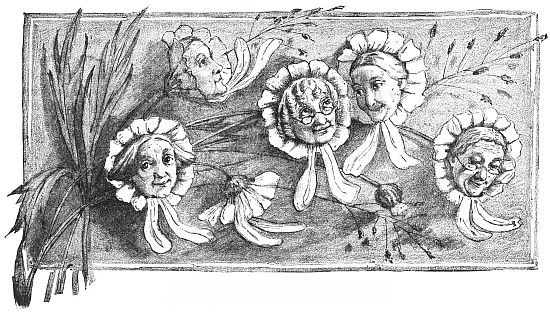
"Oh, I know they are to eat," Nettie said, smiling in answer to his laughter, "and I know how to make nice crust for pot pie; but for all that, I cannot help feeling sort of sorry for the pretty fluffy chickens. Are you going to fat them all, to eat; or raise some of them to lay eggs?"
"I don't know what we are going to do, yet," Jerry said with pointed emphasis on the we. "You see, we have not had time to consult; this is a company concern, I told you. What do you think about it?"
Nettie's cheeks began to grow a deep pink; she looked down at the hurrying chickens with a grave face for a moment, then said gently: "You know, Jerry, I haven't any money to help buy the chickens, and I cannot help own what I do not help buy; they are your chickens, but I shall like to watch them and help you plan about them."
Jerry sat down on an old nail keg, crossed one foot over the other, and clasped his hands over his knees, as Job Smith was fond of doing, and prepared for argument:
"Now, see here, Nettie Decker, let us understand each other once for all; I thought we had gone into partnership in this whole business; that we were to fight that old fiend Rum, in every possible way we could; and were to help each other plan, and work all the time, and in all ways we possibly could. Now if you are tired of me and want to work alone, why, I mustn't force myself upon you."
"O, Jerry!" came in a reproachful murmur from Nettie, whose cheeks were now flaming.
"Well, what is a fellow to do? You see you hurt my feelings worse than old Mother Topknot did this morning when she pecked me; I want to belong, and I mean to; but all that kind of talk about helping to buy these half-dozen little puff-balls is all nonsense, and a girl of your sense ought to be ashamed of it."
Said Nettie, "O, Jerry, I smell the potatoes; they are scorching!" and she ran away. Jerry looked after her a moment, as though astonished at the sudden change of subject, then laughed, and rising slowly from the nail-keg addressed himself to the hen.
"Now, Mother Topknot, I want you to understand that you belong to the firm; that little woman who was just here is your mistress, and if you peck her and scratch her as you did me, this morning, it will be the worse for you. You are just like some people I have seen; haven't sense enough to know who is your best friend; why, there is no end to the nice little bits she will contrive for you and your children, if you behave yourself; for that matter, I suspect she would do it whether you behaved yourself or not; but that part it is quite as well you should not understand. I want you to bring these children up to take care of themselves, just as soon as you can; and then you are to give your attention to laying a nice fresh egg every morning; and the sooner you begin, the better we shall like it." Then he went in to breakfast.
There was no need to say anything more about the partnership. Nettie seemed to come to the conclusion that she must be ashamed of herself or her pride in the matter; and after a very short time grew accustomed to hearing Jerry talk about "Our chicks," and dropped into the fashion of caring for and planning about them. None the less was she resolved to find some way of earning a little money for her share of the stock company. Curiously enough it was Susie and little Sate who helped again. They came in one morning, with their hands full of the lovely field daisies. The moment Nettie looked at the two little faces, she knew that a dispute of some sort was in progress. Susie's lips were curved with that air of superior wisdom, not to say scorn, which she knew how to assume; and little Sate's eyes were full of the half-grieved but wholly positive look which they could wear on occasion.
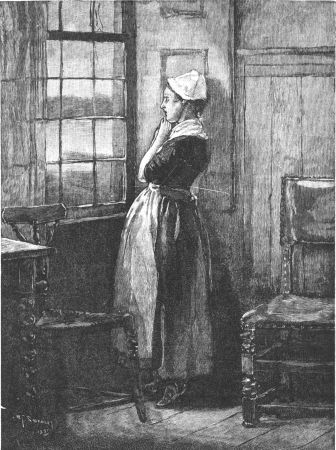
"What is it?" Nettie asked, stopping on her way to the cellar with a nice little pat of butter which she was saving for her father's supper. Butter was a luxury which she had decided the children at least, herself included, must not expect every day.
"Why," said Susie, her eyes flashing her contempt of the whole thing, "she says these are folks; old women with caps, and eyes, and noses, and everything; she says they look at her, and some of them are pleasant, and some are cross. She is too silly for anything. They don't look the least bit in the world like old women. I told her so, fifty-eleven times, and she keeps saying it!"
Nettie held out her hand for the bunch of daisies and looked at them carefully, and laughed.
"Can't you see them?" was little Sate's eager question. "They are just as plain! Don't you see them a little bit of a speck, Nannie?"
"Of course she doesn't!" said scornful Susie. "Nobody but a silly baby like you would think of such a thing."
"I don't know," said Nettie, still smiling, "I don't think I see them as plain as Sate does, but maybe we can, after awhile; wait till I get my butter put away, and I'll put on my spectacles and see what I can find."
So the two waited, Susie incredulous and disgusted, Sate with a hopeful light in her eyes, which made Nettie very anxious to find the old ladies. On her way up stairs she felt in her pocket for the pencil Jerry had sharpened with such care the evening before; yes, it was there, and the point was safe. Jerry had made a neat little tube of soft wood for it to slip into, and so protect itself.
"Now, let us look for the old lady," she said, taking a daisy in hand and retiring to the closet window for inspection; it was the work of a moment for her fingers which often ached for such work, to fashion a pair of eyes, a nose, and a mouth; and then to turn down the white petals for a cap border, leaving two under the chin for strings!
"Does your old lady look anything like that?" she questioned, as she came out from her hiding place. Little Sate looked, and clasped her hands in an ecstacy of delight: "Look, Susie, look, quick! there she is, just as plain! O Nannie! I'm so glad you found her."
"Humph!" said Susie, "she made her with a pencil; she wasn't there at all; and there couldn't nobody have found her. So!"
And to this day, I suppose it would not be possible to make Susie Decker believe that the spirits of beautiful old ladies hid in the daisies! Some people cannot see things, you know, show them as much as you may.
But Nettie was charmed with the little old woman. She left the potatoes waiting to be washed, and sat down on the steps with eager little Sate, and made old lady after old lady. Some with spectacles, and some without. Some with smooth hair drawn quietly back from quiet foreheads, some with the old-fashioned puffs and curls which she had seen in old, old pictures of "truly" grandmothers. What fun they had! The potatoes came near being forgotten entirely. It was the faithful old clock in Mrs. Smith's kitchen which finally clanged out the hour and made Nettie rise in haste, scattering old ladies right and left. But little Sate gathered them, every one, holding them with as careful hand as though she feared a rough touch would really hurt their feelings, and went out to hunt Susie and soothe her ruffled dignity. She did not find Susie; that young woman was helping Jerry nail laths on the chicken coop; but she found her sweet-faced Sabbath-school teacher, who was sure to stop and kiss the child, whenever she passed. To her, Sate at once showed the sweet old women. "Nannie found them," she explained; "Susie could not see them at all, and she kept saying they were not there; but Nannie said she would make them look plainer so Susie could see, and now Susie thinks she made them out of a pencil; but they were there, before, I saw them."
"Oh, you quaint little darling!" said Miss Sherrill, kissing her again. "And so your sister Nettie made them plainer for you. I must say she has done it with a skilful hand. Sate dear, would you give one little old woman to me? Just one; this dear old face with puffs, I want her very much."
So Sate gazed at her with wistful, tender eyes, kissed her tenderly, and let Miss Sherrill carry her away.
She carried her straight to the minister's study, and laid her on the open page of a great black commentary which he was studying. "Did you ever see anything so cunning? That little darling of a Sate says Nannie 'found' her; she doesn't seem to think it was made, but simply developed, you know, so that commoner eyes than hers could see it; that child was born for a poet, or an artist, I don't know which. Tremayne, I'm going to take this down to the flower committee, and get them to invite Nettie to make some bouquets of dear old grandmothers, and let little Sate come to the flower party and sell them. Won't that be lovely? Every gentleman there will want a bouquet of the nice old ladies in caps, and spectacles; we will make it the fashion; then they will sell beautifully, and the little merchant shall go shares on the proceeds, for the sake of her artist sister."
"It is a good idea," said the minister. "I infer from what that handsome boy Jerry has told me, that they have some scheme on hand which requires money. I am very much interested in those young people, my dear. I wish you would keep a watch on them, and lend a helping hand when you can."
When sixteen he opened a little school, and the next thing was to study Latin and Greek. The boy had set his heart on college, and it almost looks as though a boy can accomplish anything with such a motto as poor William's. He borrowed some Latin and Greek books, and set hard to work. Soon his dear parents died, and so the care of a brother and sister fell upon him. On entering college he found that he had worked too hard—for his eyes so failed that he had to leave off study and wear a green shade, but still he would not give up. He got his room-mate to read to him. He not only pushed through college himself, but helped his brother through also. Amid all these difficulties he graduated with high honors, became a professor in the same college, and was ever found in the path of duty and rectitude. Remember William, my little ones, and resolve on some plan of life, and pursue it with all your heart and soul.
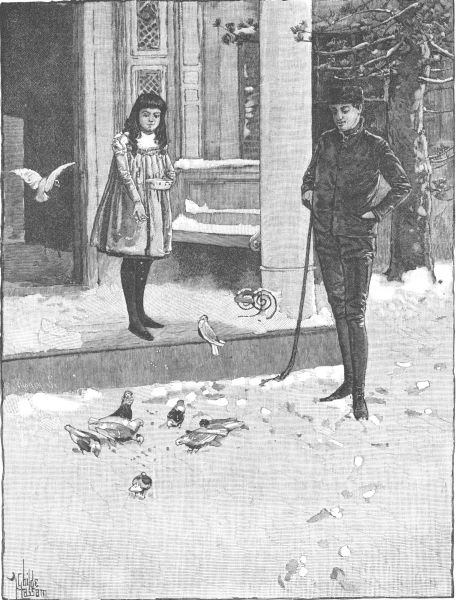
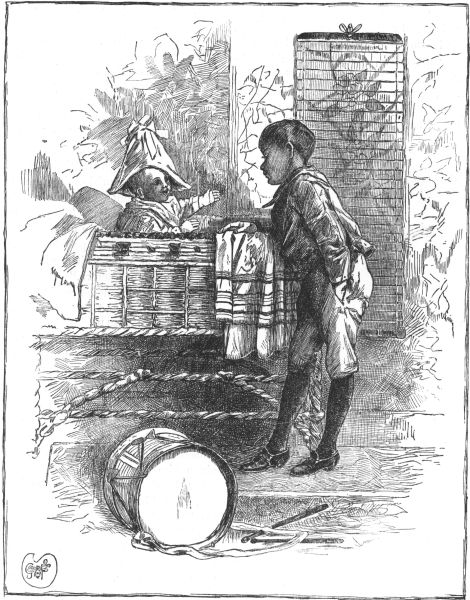

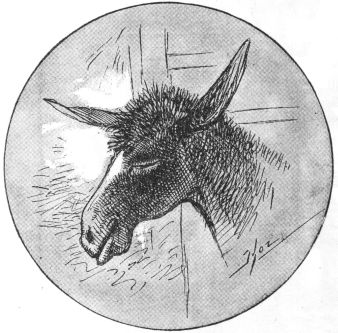
Once there, laughing at their funny pranks, Arthur cared not to go a step further or see anything else. Suddenly looking around he exclaimed, "Father, do see that queer chap up there, making faces and shaking his head at some of us. I wonder what he would do if he could get at us."
"Scratch your eyes out, maybe," said a strange voice.
Arthur started at the unaccustomed tones and searched anxiously the many faces for his father's, but it was not among them. Where was he? Was Arthur alone? Had his father left him in such a place?
He pressed his way out of the throng, hurried this way and that, wondering what he should do, when to his great joy there sat his father looking up at a donkey that stood in a high place calmly contemplating the people below.
"Why, father," broke out Arthur, "I feared I or you was lost. But what are you doing in this spot, looking at that stupid beast? Did you never see a donkey before?"
"Not such a donkey," was the answer.
"Umph! what's a donkey pray, but—a donkey? Stubborn, ugly thing. Come and see the monkeys and enjoy yourself. All the people are there. They are cutting up enough to make you laugh yourself to pieces."
"And yet, my boy, there is more in that dead, stuffed donkey to interest your father than all the rest of this museum and every monkey in Africa to boot. You see the donkey has not a very beautiful face, neither is his motion the most rapid or graceful, and sometimes he is a bit stubborn, though that is because he is cruelly treated, yet the world of business could get on quite well without tigers and monkeys; not so well without donkeys. They are not for show, but for work, like some plain folks whose hands are rough doing other people good."
"But what about this donkey? I never saw one in a museum before."
"And you may never again. This one wrote his own history, and he did it in five minutes, and with his heels!"
"How in the world was that?" asked Arthur.
"That donkey, I am told, was at work in the park. A lion broke from his cage. He was hungry. He saw the donkey as he went leaping through the grounds and sprang upon him. A terrible fight followed. The donkey had neither teeth nor claws like the lion to defend himself. He could not get away. But God had given him great strength—so, with a mighty effort, he shook off his enemy and quickly turning, dealt him rapid and strong kicks, planting his blows between the eyes of the lion and tumbling him into an abyss, where the stunned beast died from his wounds. The brave donkey, however, was so dreadfully cut here and there by the lion's teeth that he soon bled to death.
"The battle was witnessed by many amid great excitement. Their sympathy was all with the donkey who was only doing what every one should do when attacked by a bloodthirsty foe—defend themselves.
"Such was the admiration for this beast which you call ugly and stubborn, that as soon as he died, a taxidermist who makes it his business to preserve the skins of animals and give them a life-like look, took this donkey in charge and there you see him.
"Here I've been sitting for one long hour looking at this stuffed beast. And I've been wondering how many of all that crowd over there by the monkeys would do and die if necessary for some noble cause. Would you, my boy?" said Mr. Essex, giving Arthur a searching look.
"God helping me," he answered, "I'll try to be right and true everywhere and every time. I should be ashamed to be outdone by a donkey."
The material for spoons is coin silver obtained from the Government mints in ingots, or from trade for old silver, or from the use of current coin. This is melted over a charcoal fire in plumbago crucibles to a certain heat, known to the adept by the appearance of the surface of the molten metal; it is poured into castiron moulds, forming bars of about seventy ounces each.
These bars are heated over a forge fire of charcoal and worked on the anvil by hammer and sledge, precisely as iron or steel is worked, or are rolled into plates or ribbons. Occasional annealings are necessary to prevent cracking.
The ribbon for the ordinary teaspoon is four and a half inches long by three eighths of an inch wide. When rolled, a blank of two and a quarter inches is lengthened to four and a half inches, to thin it down to spoon thickness. Before rolling or hammering, silver is very nearly as soft as lead; but with these mechanical processes it can be made hard and rigid. Good springs can be made of silver hammered or rolled.
To form the bowl of the teaspoon, the bar, of three eighths of an inch wide and less than three thirty-seconds of an inch thick, is hammered flat on an anvil with a crowning face until the workman has spread it into an oval, which is much thinner in the middle than at the edges, as the edges are to receive the bulk of the wear. The handles are formed also by the hammer.
The curvature of the bowl is produced by repeated "coaxing" blows by a steel punch and a die of cast composition of lead and tin. No file dressing is employed on the faces of the spoon; only the edges are file-dressed to form. From the anvil and the die the spoons come to hand-smoothing with Scotch gray stones and polishing by stiff brushes, generally revolving brushes charged with "grits" and oil. Burnishing is the finish of spoons as of all bright silver goods.
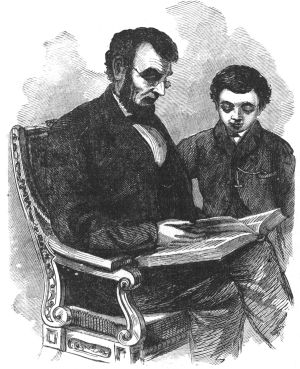

In 1809 Abraham Lincoln was born in a lonely cabin on the banks of a small river or creek in Kentucky; born to poverty, hardship and obscurity, born to rise from obscurity, through poverty, hardship and toil to the highest point of an American boy's ambition. He early learned the meaning of privation and self-denial. The accounts of his early life are somewhat meagre, but he has told us himself that he had only about one year of school-life. Think of that, you boys who are going steadily forward year after year, from the primary school through all the intermediate grades up to the advanced, then to the academy, thence to college, and afterwards to law and divinity schools, think of Abraham Lincoln's school privileges and be thankful for your own. And more, show your appreciation by your improvement of your advantages.
Like many of our great men, Lincoln was what we style a self-made man, and yet it seems that he owed something of his making to his stepmother. His own mother died when he was a small boy, and the new mother who sometime after came into the family was very helpful to the boy, encouraging him in his love of books, and under her guidance he became a great reader, devouring every book he could lay his hands upon. Did it ever occur to you that it might be an advantage to some of us if we had fewer books? Driven back again and again to the few, we should read them more carefully and make the thoughts our own, and perhaps the stock of ideas gathered from books would even[85] exceed that which we gain from the multitude of books we have in these days of bookmaking. Whether you read much or little, few books or many, boys, read with careful thought. Take in and digest thoroughly the thoughts presented to you.
Well, this young man had but few books, but he seems to have laid by a number of ideas which should develop in time into acts which were to startle the world and overthrow existing institutions. He worked through his boyhood and early manhood with his hands, sometimes on a farm, sometimes as a clerk in a country store. Now as a boatman, now at clearing up and fencing a farm.
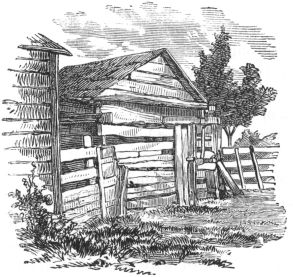
It was while engaged in this last-mentioned employment that he earned the title afterwards given him in derision by his political opponents, "The rail splitter," but I suspect that he could have answered as did the boy who in the days of prosperity was taunted with having been a bootblack, "Didn't I do it well?"
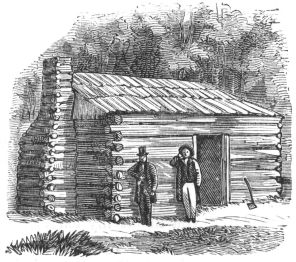
At length the way opened—or, as I think, he by his exertions forced a way to study law, and he began his practice of the profession in Springfield, Ill.
I ought to have told you, however, that before his admission to the bar he served in the Black Hawk War as captain of a company of volunteers. He soon gained distinction as a lawyer, but presently became interested in politics.
And from that time his history is closely identified with that of his country. To tell you of the leading incidents even of his career would be to give you in a nutshell the history of the United States for that period. His noted contest with Stephen A. Douglas, his election to the presidency, his re-election, his celebrated Emancipation Proclamation, all these matters belong to the story of the stirring events of those years of our history. Then came the sad ending of this noble life; the cruel assassination of the beloved President, and the great man of the time.
Boys, you who have studied his character, will you tell me what made Abraham Lincoln great?
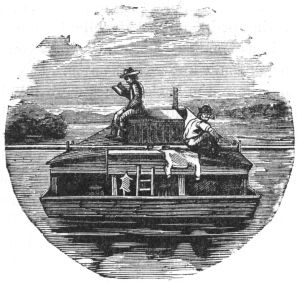

"As for my second part, that came from way down in the earth too, in the form of a black stone. Then it was, like the copper ore, carried off and dumped, and great rollers came and crushed it as small as those nuts that you like so much—I don't know their name.
"From there, the little stones were all shoveled into big pots, and roasted for a very long while until they turned into liquid and dropped in little drops down into great pans. From there they were put into other pots, where they were again melted and stirred and skimmed, just as your mother treats her milk. Then the liquid was poured into great holes that cooled it off, and it came out one great beautiful cake of zinc. That is all that there is about my second part.
"The two large sheets were then both sent in a train to a large manufactory, and the zinc was put in a furnace, where it was entirely melted, and then the sheet of copper (twice as big as that of zinc) was broken up and mixed in, where it also melted. After this was roasted a good deal, it was poured into moulds which made it into good-sized plates, and it was called brass. So my first and second parts were united, and I was neither copper nor zinc, but brass.
"The sheet of brass out of which I came was packed with many others, and sent to another large building, where it was unpacked, and by means that I never understood, and never expect to, was drawn through enormous rollers, which cut it into long, square rods. I will only tell you of the one out of which I came.
"It was speedily made pointed, and a workman passed it through a small hole, where a pair of pincers took right hold and pulled it along; then it was put around a sort of wheel, which went round and round, drawing the rod through the hole, and making it smaller and smaller all the while, and winding it around itself. Then the point was put through a smaller hole, and drawn through again, until it went through actually twenty-five holes! I counted.
"Every little while the rod which had become wire then, was melted red-hot, and then doused in cold water. I do not know what this was for.
"Soon the wire was quite small, of a bright yellow color, and was coiled on wheels, and put in large dark boxes, to take a journey. The journey seemed long to me, though I do not suppose it was. When we reached our destination, several coils of wire were sent up in wagons, to a large building in the city, where we were unloaded, and carried in. My coil was taken off the wheel and wound round a little reel that stood at the end of a queer-looking machine.
"My part of the wire was at the very end, and I felt myself suddenly seized by a little steel thumb and finger, and drawn forward a little, where an immense pair of shears suddenly cut me off to about the length that you see me now. Going on a little further in my journey through the machine, I was suddenly between a pair of rollers that mashed me all down except where my head is, so that while I had had no head before, I was possessed of one now. Going on still further, I confronted a sort of a grindstone, which rubbed my point down so speedily that while I was wondering what it was going to do, I found I had a point. Then my journey suddenly ended, and I dropped into a trough where there were many pins like myself; and now that[87] I may give you an idea of the amazing velocity with which I journeyed, I will tell you what cannot but be true, I was not longer than ten seconds in going from the coil of wire to the trough.
"You may think, my dear friend, that this must have been very uncomfortable, and have hurt me a great deal, but Providence is good, and has provided for me so greatly, that I, because I have to go through adventures that would cost you mortals so much sufferings, actually have no feelings at all! Therefore it was, that while it was disagreeable, this being pounded and jammed so much, I cannot truthfully say that it hurt me in the least. You must excuse that bit of moralizing.
"Well, from the trough we were carried off, and put in kettles of what they called nitric acid, with pieces of tin in it. Then we were boiled again over a hot fire, much to my dismay, for I thought that now I was a pin, I had got through being boiled and roasted. But there I was boiling again, and the tin melted and stuck to me all over, so that I looked like silver instead of the bright yellow that I had been before. When we had dried sufficiently we were all buried in a barrel of sawdust, and rolled and rolled. This, it seems, was to make us shine more, and when I came out, I shone like crystal.
"From this place we were all carried off in barrels again, and thrown ruthlessly down where there were some steel bars awaiting us, and we started to drop through them, but were caught by our heads, and the bars dropped down with us, and we again dropped—into the holes pricked in the green paper. All of my companions had not been caught by the steel bars, but had dropped below them, and I never saw them again.
"Now that I was a pin, all dressed up in my coat of tin, and having a couple of holes to stick through, I was perfectly happy, especially as I had so many pleasant companions.
"The paper that I had dropped in, had a row of black pins as well as silver-colored ones. These informed me that when they had been carried up to the pots to boil, Japan varnish—whatever that may be—had been used, instead of tin, making them black.
"Soon we were packed, with many others, in a large box, taken to the depot in a wagon, and sent off on the cars. It was very dark in the box; but there were so many of us we had rather lively times, after all. Still we by no means regretted it when at last the journey was ended and our box was opened."
Mr. Tyler, the minister, owned a large dog named Watch, who was bent on going to church with Mrs. Tyler. She was opposed, fearing that he might excite the mirth of the children.
Every Sunday a series of manoelig;uvres took place between the two, in which Watch often proved himself the keenest. Sometimes he slipped away very early; and Mrs. Tyler, after having searched for him to shut him up, would go to church and find Watch seated in the family pew, looking very grave and decorous, but evidently aware that it was too late now to turn him out. Sometimes he would hide himself until the family had all started for church, and would then follow the footsteps of some tardy worshiper who tiptoed in during prayers with creaking boots; and then didn't Watch know that Mrs. Tyler would open the pew door in haste, to prevent his whining for admission?
When Mr. Tyler became in earnest in his appeals, he often repeated the same word with a ringing emphasis and a blow on the desk cushion that startled the sleepers in the pews.
One day he thus shouted out, quoting the well-known text, "Watch! watch! watch, I say!" when bounce, came the dog almost into his arms.
You may be sure that the boys all took occasion to relieve their pent-up restlessness by one uproarious laugh, before their astonished parents had time to frown them into silence.
Honest Watch had been sitting with his eye fixed, as usual, on the minister. At the first mention of his name, he went, his ears and his eyes kindled; at the second, he was still more deeply moved; at the third, he obeyed, and flew completely over the pew rail and pulpit door, with leaps that did equal honor to his muscular powers and his desire to obey. After such a strict interpretation of the letter rather than the spirit, Watch was effectually forbidden church-going.—Selected.
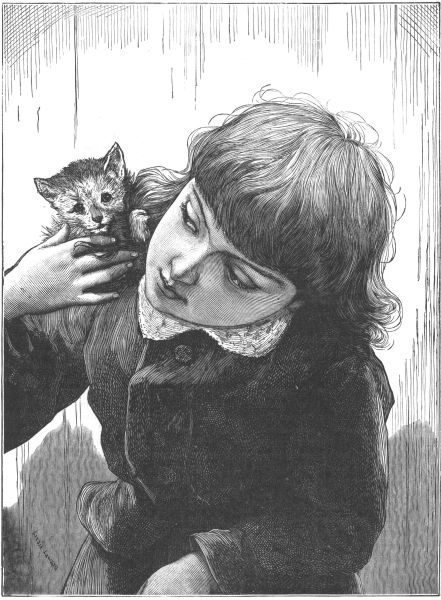
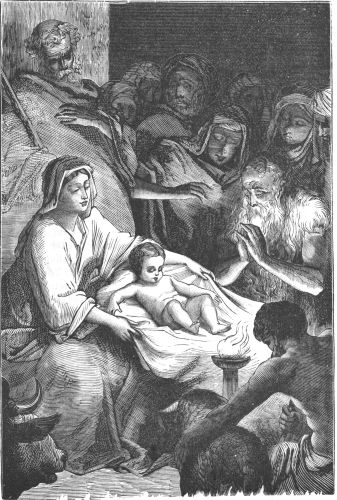

"You are a brave boy," cried Hortense's father, uncle Gerald.
"You've saved her life," exclaimed Hortense's mother.
Hortense disengaged herself from her parents, and ran up to her cousin, putting her arms around him.
"I wasn't good. I wouldn't go up stairs when he told me, and I climbed up on the window-sill to lean out and see Santa Claus coming, and I slipped, and the window came down on my fingers, and I rolled around on the shed and most pulled him off."
"And you needn't try to hide your hand," said uncle Thomas, where they were visiting, "because we all see that it is bleeding."
At that there was a second rush for the hero of the hour, and the excited relatives each had to examine for himself and herself George Edward's thumb torn by the catch of the blind as he pulled himself up.
To save him from further sympathy, his mother seconded his proposition to have the Christmas stockings then and there.
"I know it is only quarter-past two," she said laughingly, "but these young folks won't sleep a wink if we send them to bed, nor I fancy will we elders do much better. Let us all go up to our rooms, give ourselves just ten minutes to array ourselves in something more festive and befitting the occasion than"—
"These bath wrappers, mackintoshes, and gossamer waterproofs," finished somebody in the group for her.
"O, aunt Fannie, aunt Fannie, what a Christmas frolic," cried two of the other mammas, not waiting for her to finish.
"O, aunt Fannie, aunt Fannie, what fun!" cried the young people.
George Edward swelled with pride at his mother's popularity. "Come on," he cried, "see who gets down first."
At that there was a regular stampede, old as well as young taking part, uncle Thomas only remaining to light the Christmas candles on the mantel and in the tall candlesticks on the piano underneath the holly and pine branches.
When the company assembled again in the library it was hard to believe that it was the same one so lately within those walls, and it was marvelous how much in the way of adornment could be accomplished in ten moments by one who gave "his whole mind to it." Some of the neckties however were tied on the way down stairs, and even boots buttoned in the same convenient resting-place, but these were only trifling matters when the general dress-parade was so fine, and nobody noticed any little discrepancy of attire in another.
The children planted themselves before the row of stockings hanging in the candlelight, and before the fire on the hearth, now poked up to its duty, and crackling away in all the proper Christmas jollity. They pretended not to be excited, but it was pretty hard work.
At last Bamford said, "Hortense is in a dreadful hurry. It's too bad to keep her waiting. Let's begin."
"So she should," said uncle Thomas, with a twinkle in his eye, "have hers at once. Hurry up, Hortie, and pull it off the nail. Bamford is so big I suppose he's going to wait till the last."
Bamford glared at him, and burst out: "Indeed I'm not. We are all children tonight."
"That's right, my boy," said uncle Thomas approvingly, "only say what you mean at first, and not get things over other people's shoulders. Now, one, two, three, see who gets his Christmas stocking first."
It carried the older part of the company back to their young days to see the scramble that followed, and they laughed until the tears came, to witness the gale the children were in. It was a Christmas frolic pure and simple, and pretty soon every soul in the room was engaged in it; the end[91] was a shower of comfits and bonbons scattered in approved style after the stockings were declared really empty, yielding nothing more from vigorous shakings.
"I never was so rich in my life," cried George Edward in a burst of gratitude, patting his pile of presents. "It was just the jolliest stocking my Santa Claus ever brought," and he marched up to put his arm around his mother's neck.
"I don't think I got as much as I did last year when I staid at home," remarked Fisher slowly and examining once more his pile. It was an awful speech to make, and it showed the soul of the boy. But it was forgiven as a slip of the tongue due to Christmas hilarity.
What a gala day! Nobody thought of being tired till well on into the night again, and then games and Christmas songs around aunt Ruth's cottage piano, being over, they one and all began to think of bed, and to speak even lovingly of the old routine to-morrow.
"I shall help you shovel the snow off, uncle Thomas, in front of the house," declared Bamford.
"So will I," cried George Edward, coming out of a yawn; "oh dear, I feel full of candy to my ears. I'd like a good pinch of salt."
"I'm almost sick of caramels," acknowledged Effie, daintily laying one by one in her bon-bon box to pick out a plain lemon drop. "Wouldn't it be dreadful to have to eat them always?"
George Edward made a wry face. Then he twisted his mouth up into a funny little pucker. "Let's make a candy bag and drop it at Tim Ryan's door to-morrow," he cried.
Tim Ryan was the man who took care of uncle Thomas' furnace, and swept out his store. He lived two blocks off in a dingy tenement house.
Effie closed her fingers involuntarily on her caramel with old-time fondness.
"Candy isn't good for poor folks," said Bamford sententiously, and cramming his mouth full of taffy.
"They get so little, it surprises their digestive apparatus," said uncle Thomas dryly. "I don't believe our contributions however in that line will harm them."
Hortense turned a stiff little back upon her precious candy pile, most of it saved with provident forethought to eat in the following days when amusements would run low. Could she?
She swallowed very hard an obstacle in her throat, said no in big letters to her own small mind, then ran over to George Edward, both hands full of sweets, and said in an odd little way all her own: "There, that's to make the poor people sick." A shout greeted her; but her mother kissed her, and Hortense was satisfied.
The baby of the group must not shame them all. So it was quite a respectable pile that at last lay in a good-sized paper bag tied with a flaming red ribbon, all ready for the expedition to Tim Ryan's after breakfast the next morning.
The candy did not injure the Ryans big and little, we will only say, but they came out of the feast with blooming sticky faces, and hearts full of gratitude toward the "Allen childer."
And then in two days they were all, that merry company, back once more in their homes, happy in the memory of the good time they had had, and full of pluck and enthusiasm for school and home life.
It was about this time that Jared Lewis, a rather dull boy in No. 9, the room that held George Edward in school-hours, broke out one day in the reading class with a new idea before them all. Jared was of a somewhat dull turn of mind, I have said. Certainly not a brilliant boy. But he held to a thought with wonderful pertinacity that once got into his mind; nothing could shake it.
They happened in the reading upon an abridged version of the Eastern legend of St. George and the Dragon, woven into a touching little English tale. We all know the stirring legend of the patron saint of England, Germany, and Venice, and of all chivalrous soldiers in the army battling against cruelty and injustice. It makes the blood leap in one's veins to read or to tell it, and one longs to grasp the good sword and go out to fight in the great world with the noble army of martyrs who enroll themselves on the side of the weak and suffering. There was many a sober little face, and one or two who pretended the light was bad for their eyes when Jared had stumbled through his rendition of the closing part. But he was so full of his new idea that his countenance was radiant and he cried in a loud assured tone, "Why, he goes to our school—he's here to-day."
"Who?" cried the teacher, and the children thrilled too suddenly, began to titter nervously.
"George Edward Allen," said Jared confidently. "He's Saint George, and he's always fighting a Dragon. He knocked a boy down yesterday for yanking a cat's tail."
The children stopped laughing, and, sharing his enthusiasm, nodded "yes, yes," to Jared. George Edward on the back seat studying his geography raised his head at the commotion. His face turned as red as fire and he made as though he would shoot his book through the air at the speaker's head. Jared went on in admiration more forcible than elegant: "He's always for the littlest dog in the fight, against the big fellows. I'd like to know if that isn't St. George."
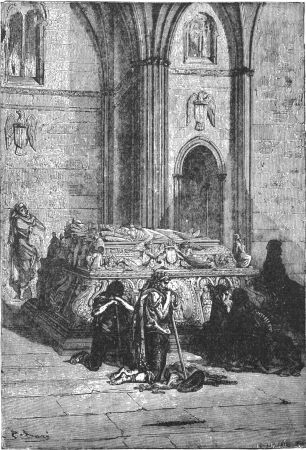

This remarkable woman, Isabella of Spain, lived four hundred years ago. Her name is always associated with that of her husband, Ferdinand, King of Castile and Aragon. Isabella was a woman of strong character and great resolution, as well as of remarkable talent. She married the one whom she wished to marry in spite of the opposition of her brother, and his threats of imprisonment. Upon the death of her brother, Henry the Fourth, Isabella was the heir to the throne. However, she met with opposition, and it was only after warring with the partisans of her rival that she gained her seat upon the throne. She reigned jointly with her husband, and their reign is spoken of as that of Ferdinand and Isabella. It was an eventful reign; many reforms were introduced, justice was firmly administered and crimes punished. The nobility were restrained from acts of oppression. Their reign is also conspicuous for the conquest of Granada; it is said that the honors of the Moorish war belonged by right to Isabella rather than her husband, for she personally directed the campaigns, and during the ten years the war lasted spent much of the time in camp. There are some dark spots which mar the brilliancy of this woman's[93] record; one is the establishment of the Inquisition.
We find that when a certain cardinal of the Roman Church presented his plan of the "Spanish Inquisition" to the King and Queen, that while Ferdinand approved, Isabella hesitated for a time; it may be that her woman's heart made her hesitate to condemn all who did not agree with her in religious matters. Perhaps you do not know what is meant by the Inquisition.
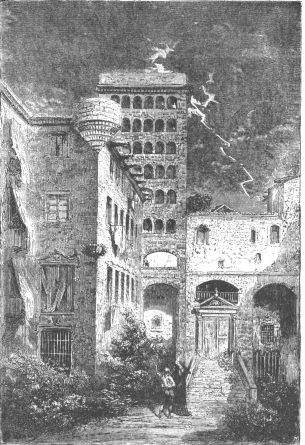
The Inquisition was a court established for the purpose of seeking out and punishing, or in some cases banishing, heretics. This meant all who were not Romanists. I cannot think that a woman so amiable, so kind and so devout, had other than good intentions in even this matter. The King and Queen doubtless had the best interests of their people at heart, and they looked also to the advancement of their church. They wanted too to gain the favor of the Pope. Doubtless there was a variety of motives urging them on; one writer says—
"Fear, piety, patriotism, absolutism and ambition" all influenced them.
And when we are inclined to condemn our beautiful queen, we must remember that she was educated by a bigoted mother, that she lived in bigoted times and that her advisers were sustained by the highest authority she recognized—the Papal court. Let us judge her leniently and put the blame of this act and of that other edict, the expulsion of the Jews, elsewhere.
Let us think of her interest in Columbus, for it was she who took an interest in his project of seeking a new world beyond the seas, and who offered even to part with her jewels in order to furnish means for the carrying out of his grand scheme.
We all know how it ended, and surely we as Americans will ever cherish her memory.
She was a most gracious queen, beautiful in face, pleasing in manner, and very loving as a wife and mother. And among the royal personages of her beloved Spain the name of Isabella stands foremost.
Gunpowder, which is as you know a mixture of saltpetre, sulphur, and charcoal separately pulverized, then granulated and dried, and guns, were first invented by Swartz, a monk of Cologne, in 1340; Edward the Third had four pieces of cannon, which contributed to gain him the battle of Cressy, 1346; bombs and mortars were invented in the same year.
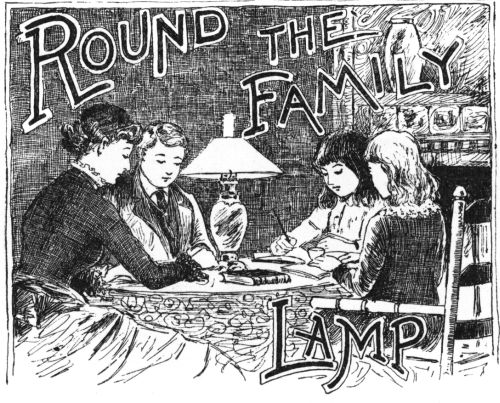
"Oh, what a question!" Ethel laughs in great amusement. "I guess I couldn't help knowing my papa, if I only saw one eye!"
Well, now you try it, Ethel, and let all the others try it—this funny and perplexing game of mummies.
Get the clothes-frame in from the kitchen, cover it nicely with newspapers, first taking the precaution to see that sheets or waterproofs conceal all the bottom of it, for of course if you saw your papa's boots sticking out, Ethel; or you, Fred, saw just an inch of mamma's blue gown that you think is just the prettiest gown in all the world, why, then you could guess the eyes that were above the boots or the gown!
If you have several pairs of eyes to guess at the same time, it is necessary to paste the newspapers securely together so as to admit back of them, a row of people. Now then, cut holes in your newspaper just large enough for a pair of eyes to see through. This is a nice job to do, as you will find out whoever does it for the first time. You will be quite surprised to see that your pair of holes look as if one eye was to be on the further side of the cheek, and, as the children say, "a mile too big," showing all the shading of eyelashes and brows. You must expect a shout at your expense as you triumphantly stand up to fit them to the one who is waiting to have them tried on him. But you will bear the fun nicely, and join in it, I hope, for let me tell you that no one who is unable to bear a joke or a bit of nice fun at himself, ought to play games. Why, the jolliest, loveliest companion in a frolic is the girl or boy who is sweet-tempered, and is so intent on making other people happy that he or she has no time to get suspicious in the mind that "somebody is laughing at him." The member of a family party who spoiled all the sweet fun of everybody, by resentment in this way at every bit of amusement started, thinking it pointed at him, was at last, all patience exhausted, dubbed "Old Porcupine," because his quills were always out, angrily trying to defend himself from nothing!
Don't you begin the New Year in this way, will you, dear Pansies, but play your games fairly, and in a kind, loving spirit.
Well, after you have your—not button-holes, but—eye-holes all ready, and your frame completed, you are all prepared for the company. If you want a row of people to exhibit their eyes, of course you must have a row of the holes. Supposing you have only one. The frame is placed in front of a door opening into another room or a hall, from which the actors are to come, the audience sitting on chairs on the other side of the frame. Now a boy or girl who is ready at speaking, and can say funny little things nicely, must stand before the frame, and introduce the strange beast or bird, or man or woman, or child, or mummy, just what the showman chooses to call it, to the assembled company. He must say, "Ladies and gentlemen, this creature is such a dangerous creature, that we can show you nothing of it but its eyes, for it might scare you. Walk up, ladies and gentlemen, and examine it at your leisure, and tell the name of this 'What is it?'" etc.
The audience after the conclusion of the speech, are allowed to walk in front of the paper frame, and give two guesses each, to whom the eyes staring at them through the eye-holes belong. If you make as wrong guesses as I do, you will distinguish yourselves!
Then after every one has guessed who the mummy is, and all wrongly, the showman commands it to step out and show itself. Then what shouts!
When all the mummies in the outer room have been exhibited, the audience can take their places, the former mummies taking the seats as[95] guessers. If you choose, there can be a change of showmen, and Ben, who did so nicely and kept everybody laughing, will now, I am sure, be willing to give his place to cousin Louise, and the game will roll on fairly. May you have great sport in it.
In future, when the game is a long one, involving many words, there will be but one given. "Round the Evening Lamp" must not crowd out the other good things planned for the Pansies, and we must all respect the printer. When you grow up and write for magazines, dear children, you will understand this!
M. S.
We can readily measure the amount of heat in different things, and we know a great deal about how it acts, but we really do not know what it is. Heat is never by itself, but always with something else. We may have hot water, we may have hot iron, but no one has ever been able to divide the heat from the water or iron, and keep it divided.
We can easily make heat pass from one thing into another, but when things which have different amounts of heat are put together the heat will spread itself around so as to make all of the same temperature. A piece of iron put into fire becomes hot, because the warmth passes from the fire into the iron until both have the game amount of heat.
Most of the heat in the world comes from the sun. We can set fire to things by gathering the sun's rays and bringing them to a point with a lens.
Ice, you well know, "is water in a solid state. It is formed under the influence of extreme cold. It is a nearly solid, transparent, brittle substance, of a crystalline structure. It melts into water at the temperature of thirty-two degrees Fahrenheit."
In hot countries ice is made in a machine worked on philosophic principles.—Selected.
Some of the best-trained ones perform all manner of dexterous tricks, much to the amusement of the great crowds. A good skater makes twelve miles an hour. Some who do not like skating have a curious sledge, resembling a ship, in which you may go twenty-four miles an hour. Is not that very wonderful?
They fasten to the vessel a very strong piece of iron which cuts into the ice. It has a sail larger than that of a real vessel of the same size, so the wind propels it, and it is steered as though on water. This, however, is quite a dangerous amusement. They are often dashed against something and broken to pieces. Besides, some cannot endure cutting the air at such a speed.
It is a grand sight to see all things like a fine panorama before you whilst travelling at lightning speed, in one of those singular sledges. In these they often go from Amsterdam to Saardam; this latter place is one of the nicest in Holland. The houses are wooden, and all nicely painted. The people are so neat that they will not permit a carriage to pass through their streets. Wealthy Dutch merchants reside here. Here Peter the Great once worked as a carpenter, to learn ship-building. Near by are two thousand windmills, and one for grinding coffee, and also sawmills, which saw thirty planks at a time.
There is a story told which I think will amuse you. An ambassador wrote to the Emperor of Morocco, that during certain seasons all the rivers of the Netherlands were covered with something resembling sugar-candy, and which could bear horses and carriages, and that vast multitudes glided over these cakes like ostriches, with smooth irons fastened to their feet. The Emperor thought this so marvellous that he called him a story-teller.
The people are very reckless; sometimes go gliding over the ice in sledges when it is really bending under their weight.
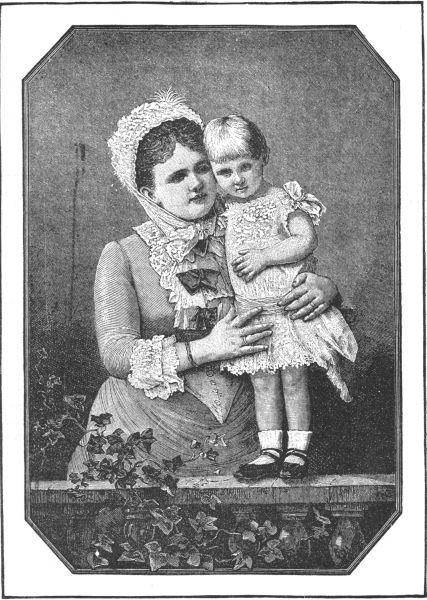
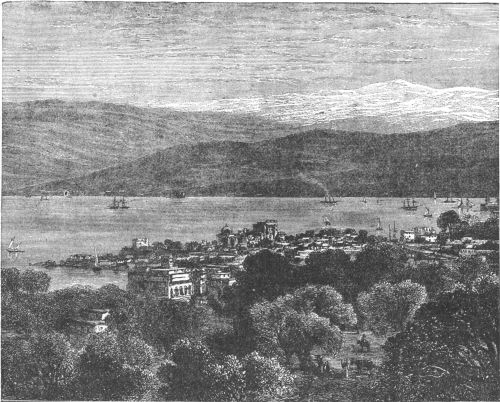

Down Gilbert Avenue in a car which made good progress, notwithstanding its frequent stops to take on more people. "Who makes it go?" asked a wee girlie who was evidently taking her first ride of the kind. Sure enough! Who did? No horse or mule; no engine to be seen; no visible means of making that car slip over the road as it did.
The child repeated her eager question: "Mamma, who makes it go? There isn't any horsie."
"It is a cable car, my child," the mother answered, with a look of profound wisdom in her eyes.
"What is a cable car, mamma?"
"It is a car that goes without horses."
"But what makes it go?" was the third time repeated query. Then the small questioner, and I, listened for words of wisdom from the mother's[98] lips. "I told you, Alice, it was a cable car; now be quiet; you ask too many questions." I think Alice and I came to the same conclusion; that the mother did not understand how to explain a cable car, and did not want to own it.
Now you are asking me what a cable car is. Oh, dear! I don't understand how to tell you; and I will own it. I have questioned until it is pretty clear to me, but as I said, I don't know how to tell it. You see, the one who explained it to me, seated me in a chair at one side, and said: "You are the engine." This astonishing statement held me quiet, while he put into my hand a tiny cord which he said was a very strong and heavy band. Being bound to believe him, I watched the band placed around a great wheel, on the street in front of me. Away down the street, about two miles, was another wheel, and a rope which had neither beginning nor end was placed around both wheels; at least that was what "he" said. To be sure, it looked to me like the study table, and an inkstand, and a tin can with some twine around them. But since I was an engine, why could not they be two great wheels connected by a rope? "Now," said the speaker, "you—being the engine, you understand—are set in motion, and the band about you being connected with this great wheel, when the band moves, the great wheels do the same, and the iron rope responds, and moves round and round. Now here comes along a car" (it wasn't, it was a spool of thread; never mind!) "here comes along a car drawn by horses; but this a steep ascent" (it was as level as the floor), "and they want to use engine power, so they take off the horses, and a little contrivance underneath grasps the chain, and away goes the car. Understand?"
Yes, I understand, after a fashion. The question is, Do you? Well, we went down town on the cable car.
Arrived at the city, we went with speed to a music store, made our way up stairs to the "parlors." We were late; every chair taken; very little standing room left. We found some, however, to stand in, and were glad even for this opportunity of hearing the sweet-voiced speaker. Who who she? Her name is Layah Barrakat.
A strange-sounding name? Oh, yes, she is a foreigner. Her birthplace is away among the mountains of Lebanon. Once she was a little heathen girl; and the strange sad things she told would have made the tears come to your eyes. If ever you hear or read that Layah Barrakat is to speak on Foreign Missions in any building near where you live, I want you to be sure to hear her.
Let me tell you the story of a pair of red shoes. Our missionaries had a Sabbath-school near where Layah lived; but she had been taught that it was a very wicked place, and she must have nothing to do with it.
One day a lady from the Mission met Layah and invited her to Sabbath-school, telling her she would make her a present of a pair of new shoes if she would come. Layah wanted the shoes; she told her mother about it and begged to go, just once, to get the shoes, promising she would not listen to, or remember a word that was said; so the mother agreed, and she went. But there she heard such wonderful things she could not help listening, and remembering; for the first time she heard about Jesus; how he loved her very much, and had a beautiful home waiting for her, and would show her the way to it if she would follow him. In all her life Layah had never heard of anything like this. She wanted to follow the kind friend who loved her. She received her shoes, beautiful red ones, and she thought a good deal of them, but when Sunday came again she wanted to go back to the school, and hear more about Jesus. She did not dare tell her mother of her wish, for she knew punishment would follow; but at last her desire to go grew so strong that she ran away. Her brother found out where she was, and came for her, scolding and whipping her all the way home.
But all the scolding could not take from her what she had learned. It is a long story, the trials she went through, and the punishments she received for wanting to be a Christian. She used to be cruelly whipped, and shut up in a dark cellar without anything to eat. But it was all to no purpose; she had heard enough of Jesus to make her hungry for him. Nothing else would satisfy her; she was determined to follow him, cost what it might.
By and by, good Doctor Nassau, a missionary, became interested in her; he wrote to some[99] friends in America, telling her story, and a Sabbath-school in West Philadelphia determined to adopt and educate her. So they gathered their pennies, and sent them out, and Layah went to the mission school; but she had to run away from home in order to do so.
The story of her life since then reads almost like a fairy tale; one can hardly imagine it possible that all the strange experiences of which she tells, could have come to her. How she grew up, and married, and went to Egypt as a missionary; how her brother, the very one who used to whip her through the streets, became a Christian, and a teacher in the Mission; how her mother, soon after, learned to love Jesus; how Layah saved many little girls in Egypt; how when the troubles came there, she escaped with her husband and child, after suffering dreadful things, and came to this country, and went wandering through the streets of Philadelphia, in search of one man whom she had met in Egypt—Dr. Dulles Chestnuts—this was his name, as she remembered it.
How the children of the streets chased them, calling them gypsies, how the very dogs barked at them, how she sat down at last on a doorstep, and cried to think that she had come to Christian America, and could find no friend; all these things are deeply interesting. I wish you could have heard her tell them.
Was it not wonderful that at last she should have found the very friend whom she sought? a policeman spoke kindly to her, took her into a store, looked in a directory for her, and found that her friend was Doctor Dulles, on Chestnut street. After that, the way to rest and help was smooth; she began to realize that she was indeed in a Christian country.
For three years she has been living in Philadelphia. She goes over the country to visit churches, and Mission Bands, wherever she is invited, to tell her beautiful, and sorrowful, and joyful, and altogether wonderful story.
Happiness is a perfume that one cannot shed over another without a few drops falling on one's self.



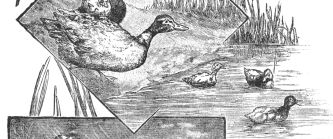
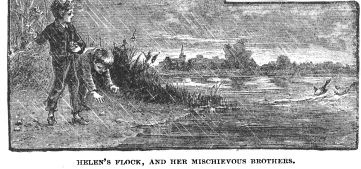
"It must be Mr. Brown's," she said to herself, "for I do not know of any one else who has young ducks," and she took the frightened and suffering duck in her arms and carried it to Mr. Brown, but that gentleman looking down upon the little girl smilingly said, "See here, little one, what would you do with it if it were yours?"
"I'd try to make it well, and then I'd make a missionary duck of it."
"A missionary duck! What is that?"
Then Helen explained that a missionary hen was one the proceeds of which in eggs and chickens were set apart by the owner for missionary money and of course a missionary duck would be the same. Mr. Brown laughed. "Well, that is a funny idea. Suppose I give you a pair—that is, I will give you this one if you will cure it, and I will give you a mate to it and we will see how much money you make out of the investment."
Helen's eyes danced with pleasure. The wounded duck soon recovered, and before the end of summer she had quite a flock of young ducks which afforded her no end of enjoyment. True she had to watch them closely and look out [100] for her mischievous brothers lest her flock come to harm, but she did not mind the trouble. Meantime there was a great interest growing up among the scholars in missionary enterprises. There were missionary hens and turkeys; missionary cabbages and turnips, and even missionary pigs. The months went by and Thanksgiving was near at hand. After considerable thinking as to the feasibility of the scheme, Miss Lee, the teacher in Number Five, proposed a plan by which some of the chickens and turkeys might be disposed of to good advantage. Willie Smith was the owner of a small printing press, and about two weeks before Thanksgiving twenty tickets bearing the words, "Thanksgiving dinner at two o'clock at the schoolhouse. Admit one," were put into the hands of two of the most energetic boys to be sold at forty cents each.

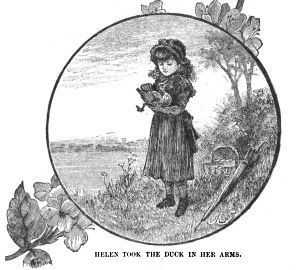
"There are a number of people in the neighborhood who will be glad to get a nice dinner and save themselves the hard work of getting it up," reasoned Miss Lee. "Mrs. Graves told me the other day that she should not try for anything extra this year on account of her lame wrist, and Miss Smith is so lonely since her brother went away, I am sure she will be glad to eat her dinner in good company."
Sure enough the twenty tickets were soon sold and more called for. Twenty more were sent out. "That is positively all we can accommodate," said Miss Lee. The dinner was a success. Four large turkeys, three ducks and a chicken pie or two were disposed of. Interested fathers and mothers had lent some slight assistance, but for the most part the work was done by Miss Lee and the scholars. The forty guests were well pleased with their dinner. The tired mothers were grateful in their hearts to Miss Lee for the thought which had given them a rest; surely it was to them a day of Thanksgiving.
At the end of the feast Mr. Brown arose and moved a vote of thanks to their entertainers, which being properly seconded and carried the gentleman continued, "I suppose it is well understood that we have been feasting upon missionary turkeys, and missionary hens, and missionary ducks as well as other good things to which the same adjective belongs. Now I trust that none of us suppose for one instant that we have given one cent to the mission cause by coming here to eat our dinner and paying a small sum for it. That is purely a business transaction; these young people have earned the money, and I congratulate them upon their enterprise. Now I understand that they have several turkeys and ducks as well as [101] other things left over. And I wish to call out an expression from the friends here who have enjoyed their hospitality to-day. Shall we have our Christmas dinner prepared for us at the same place and under the same auspices? All in favor say 'aye.'"
Then such a shout as went up seemed almost to raise the roof. A little time was spent socially, during which Mr. Brown told the story of the lame duck, and added as he finished, "Our little Helen here gave me an idea and I do not know but I may as well tell you that I have a missionary cow nowadays!" Presently the diners-out went to their homes, leaving the young people to their dinner and their work of clearing up.

Just before leaving home for the Islands Bertie had been taught a bit of a poem which he had recited at a Sunday-school concert. One line ran:
The soldiers were strolling about in pairs and singly, and Bertie stood near the fountain watching a fine-looking fellow who had stopped for a cool drink of sparkling water. Suddenly the words of his recitation came into his mind and without hesitation he stepped up to the stranger and said:
"Man, are you a soldier fighting for the right?" and then stood still looking at the soldier as if waiting for a reply.
"Who are you?" asked the stranger.
"Oh,
The soldier's name was John Lewis; he turned away and rejoined his companions, but the words of the fair-faced, soft-voiced child still sounded in his ear. He was not fighting for the right; he was perfectly well aware that he had enlisted upon the side of the leader who is bound to oppose the right under all circumstances.
He knew that the banner under which he was marching had sin written all over it. It was Satan's banner, and he was doing work for that leader that was telling upon his own life. It already, young as he was, began to show in his face, in his unsteady step and foul breath. He knew that so surely was he bound to the service of that master, that if he could have found a glass of liquor upon the grounds he would not have stopped to drink at the fountain, and would not have given Bertie the opportunity for his childish questioning.
Some way, the voice would not be stilled. "Fighting for the right!" If not, why not? Because I am a fool; he did not say this aloud, but in his own heart he knew it was true. And there came to him the memory of a quiet country village, of a little sitting-room, a round stand, a Bible, a chair where he knew that mother often knelt and prayed for him, asking that he might be led to enlist under that other banner, even the banner of Jesus Christ.
"What is going on under that big tent?" asked one of his comrades.
"They are having some sort of a religious meeting, I reckon," replied another.
"We may as well stroll over that way and look in for a while. It will do no harm to mix in a little religion, I suppose."
And so the three "looked in" upon a religious service held in the great tabernacle. Strangely enough the speaker who occupied the platform uttered words which exactly matched John Lewis' mood. The others thought them commonplace enough, but to John Lewis' newly-awakened consciousness they seemed simply wonderful.
"That man is fighting for the right," he said to himself; "now if I were! What if I should turn right about and resign my commission in Satan's army and enlist in the army of the Lord? What if I should now? Wouldn't the boys stare?" and he chuckled inwardly over the thought of their amazement at such a move on his part. "And what would mother say? I don't know but she would die of joy. That would be a pity, but, after all, it might be better than to die of grief, and I reckon she'll do that if I keep on fighting under the old leader. I believe I will make a swap."
"Next summer" had come. Again John Lewis joined his comrades on an excursion to the Islands; again he drank from the fountain, and as he turned away he said to a friend:
"It was right here that the little fellow asked me that question. I would like to see him again and tell him I am fighting for the right now."
But Bertie was not to know of the result of his interest in the stranger. He has never seen his soldier friend since that day of his first missionary effort, but we hope that both are still fighting for the right.
I hope you will never see such a sad sight as our little children saw this evening. A Turcoman who has his tent in our yard was beating his poor wife, and the little children—his children, I mean—were running away screaming. You would think their houses very curious were you to see them. His wives build his house for him in a very short time when the fleas become so plenty that they are compelled to move. The materials consist of a ridgepole, some boards, and two wooden troughs, one for each side. Crotched sticks are driven in to hold the ridgepole, the pole laid across, and the boards set up against it with the ends placed in the troughs which are for the purpose of carrying off the rain. This man's mother lives in a tent of black cloth made of goat's hair. Poor old woman! She has quite a number of grandchildren whom one would think she might pet, but she sits nursing and fondling a little kid. It is a pretty sight to see the great flock of goats go out in the morning, and come home in the evening. There are black, white, gray and mottled. Some are huge fellows, as large as a calf. A few nights ago a wild beast of some kind caught a kid. The kid made an outcry, and the dogs came and rescued it. We heard afterwards that the beast was a leopard, which has its den about half a mile away from us. It has carried off seven goats from one of our neighbors.
Now I must tell you a little about our schoolgirls. There are nine. Two of these are Moslems and had heard nothing about the true religion except what little they may have learned from their brother, who was last year baptized into the Christian church. Since coming here in the last of June they have committed to memory all of the Short Catechism known in English as Brown's, and ten Psalms. The eldest a few days ago when taking some gum arabic to her teacher, took a lump and hid it away. Some of the girls saw her trying to hide something away, and found out what it was. Her teacher then talked to her, and told her how wrong she had done. Since then she asked if it was stealing [103] to taste the food as she was cooking it. It is so new to them to be taught that it is wrong to break the Sabbath, to tell lies or to steal, if the article stolen is of little value. The man of whom I told you above says of us, "Ah, you have everything very nice here, and we have nothing, but hereafter you will be tormented, and we will be happy in the Paradise that Mohammed has prepared for us." Is it not sad to think of such delusion? This very man cheats on all hands, and is even said to be connected with a gang of thieves.
And now I will give you an instance of an Arab's self-respect. A day or two ago a man brought three quails, and said such a man had sent them as a present to the doctor. The doctor thanked him, and then the man wanted a present for bringing them. "Give him the quails," said the doctor, and off he went with them again.
I could fill pages with accounts of the dreadful effects of heathenism on this people, but it is only what is seen in every place where the Gospel has not yet gone. This is the hardest trial of the missionaries' life—more than any physical deprivation—the being compelled to live among such people. It always makes me think what a long martyrdom the life of our blessed Saviour must have been on earth. It was not only that he saw and heard such things, but he knew every thought in the wicked hearts of those about him. Dear little sisters, will you not begin even in your childhood to work for Him? To deny yourselves that these benighted miserable people all over the world may have this Gospel light? And you can always pray for those who are engaged in this work. I hope some of you may grow up to go far away to the Gentiles yourselves.
A little Moslem child accounted for her preference for the Christian religion by saying, "I like your Jesus because he loves little girls. Our Mohammed did not love little girls." With unerring instinct she had seized upon at least one of the great differences between the two religions.
This woman lived on the Ganges, near Sanger Island. She was the mother of a pair of beautiful twin babies. But one of these children was a girl, and the poor benighted mother on that account supposed herself to be under "Gunga's" curse for some offence she had committed.
A missionary's wife found her lamenting, and heard the story of her grief. The god must be appeased, the woman said. He was certainly angry, or the children would have both been boys, and with good eyes. She would have to make a sacrifice to soothe his wrath.
The Christian lady did what she could to impress her with better teachings, but with little effect. She left her sadly, never for one moment dreaming what the wretched mother meditated doing.
A day or two later the lady called again. As before, the mother sat beside the little basket cradle weeping—for this time there was but one baby in the cradle. It was the poor little blind girl. The other had been drowned in the Ganges.
The Christian lady was horror-struck when she knew the truth.
"Unhappy woman!" she exclaimed; "if you were driven to do this, why did you destroy the child you loved, and spare the one you hated?"
The woman sobbed and beat her breast piteously.
"O, it is that that breaks my heart," she said. "The god must have the best. When I had a perfect one he would not take the other. Alas, my boy, my boy!"
Why should not many who live in this land of light be shamed—not by the deed, but by the devotion of this poor heathen? Under the gentle law of Christ, we know that God's demand for the best we have only bids us use it for him, and devote it to him.
If we serve him selfishly, may not even the poor dark-souled Hindoo mother rise up and condemn us?—Selected.
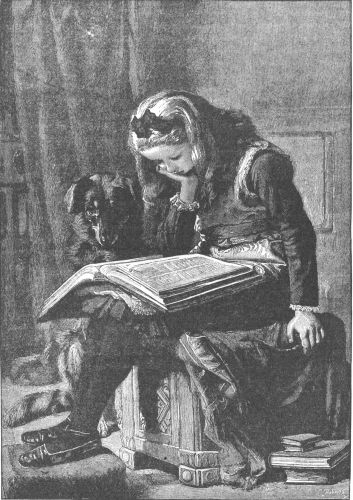
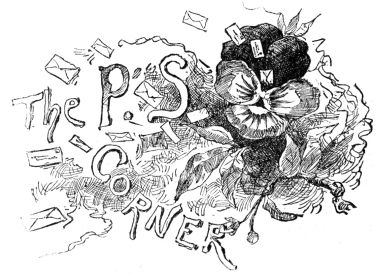
Ah, I did not say that; but don't you know, if you are soldiers of the great King, he will take care of you; and whatever happens will give you the sweetest, highest happiness there is in this world?
We talk about things "happening," but it is well for us to remember that this King of ours manages all things, and is pledged to make "all things work together for good," to those who belong to him.
How many of you are blooming for him?
How many of you who have not yet settled the question, will come over to His side before this New Year's Day is done?
Oh, I hope you are all preparing for a Happy New Year.
Fred from Rhode Island. I am sorry your "other letter" was not answered, but glad that you did not wait for it. It is so pleasant to hear that the badges help our young people. So you found The Pansy blooming where you did not expect it? The truth is, we Pansies are a very large family, and are wonderfully scattered. I have marked your letter to be copied, for the other Blossoms to enjoy.
Mary and John from Tarsus. Dear, far-away Blossoms, we welcome you. How strange it is to think that in the very country where the great Paul lived so many years ago, two little Pansy buds are growing for Jesus. I hope you may be very fragrant flowers in that far-away land. Will you give my love to little Robert Livingstone?
Gertrude from New York. I am glad for you. "Whining" is a habit very easy to form, and very hard to break. It requires a good, strong resolution, such as you have made. As for "prompt obedience," I heard a gentleman once say, that no one was fit to command, who had not learned to obey.
Grace from Pennsylvania. You have asked a hard question, my dear. How can we interest people in things in which they have no interest? Let us see. In the first place, we must be very much interested ourselves, and must know just why we are interested, and just what we hope to do, by securing others to join us. Many of the P. S. have weekly meetings where they do some benevolent work, and have many an interesting book read to them while they work. Others have a literary society. What have you tried to do? Tell us the whole story, and we will try to help you.
Susie from Pennsylvania. The "Whisper Motto" is: "For Jesus' Sake." All the Pansies who choose it for their motto are expected to try to live by it. To do nothing which they think Jesus would not like, and to take him for their pattern. I am glad you like The Pansy.
Nettie from Ohio. Dear little Blossom, I was very much interested in your letter. I read it to a friend who said she would send you The Pansy for one year, for a Christmas present. So you may expect it to visit you as usual. I am glad you and your little sisters like it so well. For a little girl who has never been to school, I think you write an excellent letter.
Harriet from Deddington. So a little American Blossom has gone to bloom in England! That is good. May the fragrance of your life be enough to give joy to all around you. Did you ever notice how easy it is to find things to fret about, if one only tries?
Edith from New York. Now, my dear, I hope you will this time understand that you are the "Edith" meant. I would like to make it "sound like you" if I could. Since you live in[2] Chautauqua County, perhaps you have been to the beautiful Chautauqua, where so many young people go every summer.
Richard from Virginia. We welcome you, my boy. If you succeed in raising a P. S. company, an officer's badge will be sent you in place of the one you now have. The habit of using "by-words" seems to be growing among our young people, both girls and boys. I am glad for every one who joins the ranks to fight against it.
Myra from New York. My wee Blossom, I was glad to receive your letter. So you want to write "nice stories"? Well, who can tell but you may write beautiful stories, one of these days? I'll tell you what you might begin to do now. Live a story, a beautiful one, so that people who know you will say one to another, "How gentle, and unselfish, and truthful, and loving Myra is!" How would that do? Yes, I know it is much harder to live stories than it is to write them; but then, they are worth more.
Bessie and Gracie from Wisconsin. Two dear sisters who are going to "help each other." I know all about that habit of impatience, Bessie; ever so many people are troubled with it. As for "contradicting," I have spent part of the day with a boy who contradicted his mother five times in the course of half an hour. Think of it!
Miriam from New Jersey. You have chosen a fault which is very common, and very trying to one's friends. "Slow obedience is only half obedience," a dear old friend of mine used to say. I have often thought of it; and I believe it is quite true. Do not you? I think you must have had a pleasant time at your celebration.
Stella from Omaha. Your pledge reminds me of a day when I was looking through a gentleman's autograph album, and came to a name which I could not pronounce. This was it: Inaminute. "What is this name?" I asked, in wonder. The young man laughed. "Oh, that was one of our boys who was always keeping us waiting; he was sure to shout out: "In a minute!" no matter how much haste we were in. So we took to calling him that; and the name stuck, somehow, and fits to this day. Some one told me only yesterday, that he never succeeded in anything he undertook, because he was always behindhand."
Harry from Pennsylvania. "A better boy in every way that I can." That is a grand pledge, Harry. It has given me great comfort to write it out in full on our pledge book, and to think while I am writing it, what a grand man there will be in Pennsylvania, one of these days, if Harry lives, and keeps his pledge. I pray God to help you every day to keep it.
May from New York. A May flower that shall help somebody every day, will be sure to shed sweet perfume. I hope my little May will blossom some day in our Father's garden, where flowers never fade.
Bella from Canada. A Pansy Blossom in Canada! Yes, indeed, many of them. This one we welcome with special joy because you are such a wee bud; only six, and pledged to try to make sunshine for the people around you, every day. God bless our little Canadian Bella!
Cora from New York. Poor little "finger nails!" I am glad they are not to suffer any more. A lady once told me that she was so in the habit of biting her nails, that when she stood before a great audience once, to speak on temperance, she found herself tugging at her glove to get to her fingers so she could bite them! Would not that have been an astonishing sight? Habit is a strange tyrant. Break away from this one, while you are young.
Henry from New York. Good for you, my boy! Half-learned lessons are very common, and very disgraceful. Please don't wear your badge at all, on any day when you fail in a lesson; I should hate to think of its being treated in that way.
Clyde from Virginia. Welcome to our Pansy Society. What kind word have you said this month, I wonder, that has helped some one on his way. A kind word a day, would make a lovely chain of kindness each year. Then, if we could follow the words and see what they did for others, what a story they would make!
Mary from Indiana. So you have overcome that habit of saying "Wait a minute." How glad mamma must be! I rejoice with you. What are you going to take up next? I presume Satan keeps you busy fighting against his[3] wishes. He is very industrious, and when he fails in one direction, he tries in another.
Frankie from Michigan. I hope mamma was not only surprised but pleased with the badge, and your reason for receiving it. Does she see you growing patient? That is not an easy lesson to learn. In fact it takes a great deal of patience to be patient!
Ida from Kansas. Your pledge was rather indefinite, my dear. I have not a very clear idea of what you mean to do. However, if you have, and are trying for it, the main point has been gained. Perhaps you will write and make the matter plainer to me.
George from Minnesota. I know a boy who has taught himself to be so cross to his little sister that she actually cries sometimes, when she sees him coming. Yet he loves her, and would shed bitter tears if God where to take her away. Why do you suppose he wants to heap up sad memories for himself, by yielding to such a foolish habit? I am glad you have taken the pledge you send.
Nellie from —— If one only gets used to it, my dear, it is really quite an easy thing to do a thing at once, as it is to linger awhile. In fact it is easier; there is such a delightful feeling about having a thing done that we did not want to do. A young girl told me once that she remembered a certain summer day in which life was bright to her, all day, because she succeeded in making her bed before her mother said to her, "Come, dear, it is time your morning work was done."
The box was some happy weeks in growing. Dollies after being dressed by patient little fingers, hopped into it gladly as if to say, "Just think of me going to comfort a little sick child. I am so glad to go." Cunning little wooden barrels and boxes that were manufactured in that Maine village, rolled and tumbled in too; toys that looked as if then their whole mission in life were to amuse hospital children, tucked themselves into all the nooks and corners until I can whisper to you all, dear members of the Pansy Society, there wasn't a bit of room left.
Oh, what a rich box! The dear little girls, those four members of the Pansy Society who believed in making others happy for Jesus' sake, put the precious box on the cars all nicely addressed to Boston. It travelled and travelled till it came to my hands; and then it took a wee journey to the hospital where it was opened by the good head nurse, who is superintendent of the wards.
I can do no better than to give you her words in the letter she stopped in her busy life to write me concerning its arrival. She speaks of the reception of the box, "that your little friends from Maine so kindly and lovingly put up for the sick children, and can I trouble you with one message of 'thank you'? Our hands are full, and all playthings are appreciated. One of the dolls has fallen to a little girl who has recently been through a very serious operation. She clings to it night and day, and as she is too sick to have the out-of-bed children play with or about her bed, dollie is quite sure to be long-lived."
Only think of the blessed mission of that one doll! That the suffering child away from its mother can "cling to it day and night." O, children, is there any sacrifice too great to be made to have the blessed privilege of comforting Christ's little ones, and helping them bear their sufferings!
Dear Minnie, Lottie, Sibbie and May, your "box-full of happiness" will never cease growing. It has made the little hospital children happy, and your own hearts warm and tender with the love that is like unto Christ's. May this New Year bring to you and to all the members of the Pansy Society many sweet, loving thoughts and desires toward making others happy. This is the best wish of my heart for you.
P. S. Will the four little Maine girls please send me their address? The old one has been lost, and I want to write them a letter.
Now "who may join?"
Every boy and girl who takes the Pansy, and is willing to promise to try to overcome his or her faults, to encourage every good impulse, to try to conquer some hard lesson at school, to do anything that shows a disposition to help the cause of right in the world. Any one who will say from the heart: "I promise to try each day to do some kind act, or to say some kind word that shall help somebody;" honest effort will be accepted as much as if success were gained.
This promise must be dated, and will be copied into the "P. S." roll-book.
The most important of all to remember is our whisper motto: "I will do it for Jesus' sake."
Whatever He will own, the "P. S." will be proud and glad to copy on its roll-book.
Then you must write a letter to Pansy (Mrs. G. R. Alden, Cincinnati, O.), saying that you thus pledge yourself, and you will become a member of the Pansy Society, and receive a badge.
Now, about the badges.
The officer's is of satin, trimmed with gilt fringe, and has a gilt pin to fasten the badge to the dress or coat. In the centre is a pansy in colors—above it the words, Pansy Society, and beneath it, Pansies for Thoughts.
The badge for members will be the same as the officer's, with the exception of having no fringe and a silver pin.
And the Pansy will help. As it has always been glad to encourage those who are struggling up toward the light, so now it reaches forth its helping hand to those little ones who will rally bravely around it, to the work of putting down the evil, and the support of all things good and beautiful.
So many of you have little brothers and sisters who want to join the P. S., and who of course do not need an extra copy of the paper, that we have concluded to receive all such, letting them pay ten cents each for their badges, if they wish them. Understand! If you are a subscriber to The Pansy, and have a badge, and have a little sister who would like a badge, write at her dictation a little letter to Pansy, taking the pledge, telling of some habit which she means to try to break, and enclosing twelve cents in two-cent stamps, ten to pay for the badge, and two to pay the postage for sending it. Her name will be enrolled as if she were a subscriber. The same advice applies of course to little brothers. Send your letters to Mrs. G. R. Alden, Chapel Street, Walnut Hills, Cincinnati, O.
It is also asked:—
What makes an officer of the Pansy Society?
You are to endeavor to organize a club of as many members as you can. Each one forming such a Club or Society will receive the Officer's badge, and become President of the same. The local Society may contain as many members as can be secured.
Then, of course, you will plan for your Society; how often it shall be called together, and what your rules shall be; whether you will sing, or visit, or work, or have a literary society, or read a book. The only thing you call on the members to positively promise is that each will try to overcome some bad habit, and will take for the whisper motto the words—
Each member of the "P. S." is invited to write to the editor, Mrs. G. R. Alden (Pansy), Cincinnati, O., how far the trial has proved a success, how many temptations have been resisted, how much progress in any direction has been made, etc., feeling sure of encouragement and loving help.
The Pansy has extra pages each month under the heading, "The Pansy Corner," in which Pansy holds monthly talks with her correspondents. There is ample space in the corner devoted to interesting items connected with the Pansy Society; also letters from its members.
Mrs. Alden would also be pleased to know how the members are getting on—what they are reading, studying, talking about, etc., and whether the badges are helping them to keep their pledges.
D. Lothrop & Co. present a remarkably attractive list of new publications possessing genuine value from every point of view, as will be evident from the following notes. The literature offered, which includes history, biography, general literature, romance, poetry, and various scientific works, presents a sufficiently wide range to meet the needs of all classes of readers.
A Family Flight Around Home, and a Family Flight Through Mexico are the two latest volumes of the Family Flight Series, by Edward Everett and Susan Hale, and deal largely with the picturesque side of history, as well as of life and scenery in the countries treated. Illustrated, extra cloth, $2.50.
Art for Young Folks. Contains a description of an art school for children in New York; biographies and portraits of twenty-four of the leading American artists, with engravings of paintings, studios, etc., etc. Quarto, boards, $2.00; cloth gilt, $3.00.
Boys and Girls' Annual, 1885. Contains original stories expressly prepared by the best of living authors who are favorites with the young folks. Extra cloth, gilt, $3.00.
Our Little Men and Women. Contains a miscellany more charming than ever. Dainty short stories with seventy-five full-page attractive illustrations, and countless smaller ones. It is especially suited for use in homes and schools, having a variety of articles on plant-life, natural history, and like subjects, written most attractively to please the little ones. Among serial articles of permanent value are "Kings and Queens at Home," "Stories of Favorite Authors," "Nests and Nest Builders," and Margaret Sidney's "Polly." Quarto, illuminated cover, $1.50: cloth, $1.00.
We Young Folks. All young people will be attracted by this book with its stories of hunting and fishing, of life in the "good old times," of famous men and women, etc. Lithograph covers, $1.50.
The Pansy, 1885, is distinguished among annuals, as formerly, by articles which commend it especially to Christian homes. It abounds in delightful stories, interesting descriptions of famous men and places, and the brightest of pictures. Lithograph covers, $1.25; cloth, $1.75; cloth, gilt, $2.00.
Some Boys and Girls. Edited by Pansy. These are stories of good times—the delightful experiences of genuine merry-hearted boys and girls in this and other lands, with much that is entertaining in biography and history. Lithograph covers, $1.25.
Storyland. A land which all little people will delight to visit. Its stories are illustrated by beautiful pictures and appear in handsome type. Lithograph covers, $1.25.
Chautauqua Young Folks' Annual, 1885. This annual has been styled "a young folks' cyclopędia." The present volume exceeds in richness all of its predecessors, new editions of each of which have been made to meet the demand for them. Lithograph cover, $1.00; cloth, $1.50.
Young Folks' Cyclopędia of Stories of Famous Authors. Favorite stories by such authors as Mary Hartwell Catherwood, Ella Farman, C. R. Talbot, Julia A. Eastman, Mrs. Hallowell, and others. Elegant cloth binding, $3.00.
Wide Awake Volume T. Contains beside other notable features Charles Egbert Craddock's brilliant Tennessee story "Down the Ravine," a stirring historical serial, "In Leisler's Time," by Elbridge S. Brooks, and Mrs. Champney's "Bubbling Teapot," with stories, poems and papers by Mrs. A. T. D. Whitney, Edwin Arnold, Margaret Sidney, Susan Coolidge, Edward Abbott, Rose Terry Cooke, etc. A frontispiece in eighteen colors, "A Merry Christmas to you," is reproduced by L. Prang & Co. in their choicest style, from drawings by L. H. Lungren. Quarto, 400 pages, boards, $1.75; cloth, gilt, $2.25.
The Golden West, as seen by the Ridgway Club, by Margaret Sidney. The fascinating record of a journey embodying material collected in personal travels by the author, and admirably adapted not only to the instruction of the young, but of older readers. It presents authentic information as to the people, natural scenery and customs of our newer States and Territories. Lithograph cover, $1.75; cloth, $2.25.
Wide Awake S. (Popular edition). Contains tales, biography, history, and poetry, with an intermingling of lighter matter, profusely illustrated, and especially adapted to the taste of intelligent and inquiring young folks. Handsome lithograph cover, $1.50.
Little Folks' Art Book. Such artists as Bodfish, Sweeney, Barnes, and Francis, have furnished outline drawings calculated to entice the little ones into attempts at copying, and thus lead them to a taste for art.
Babyland, 1885, is, as usual, "radiant with pictures of bonny baby life, and its rhymes and jingles ring with sweet glee and laughter." Quarto, lithograph cover, 75 cents; cloth, $1.00.
The Procession of the Zodiac. Here are twelve ideal figures and landscapes representative of the Zodiac signs, drawn by Jessie McDermott, and effectively printed in brown. A pretty legend or story, by Margaret Johnson, accompanies each picture. Quarto, lithograph cover, 75 cents, cloth, tinted edges, $1.00.
No Questions Asked. In this volume we have a characteristic comedy by Charles R. Talbot ("More than they bargained for"), with two sparkling stories for children in the style of Howell's "The Elevator."
Baby Barefoot. By Mary Harris McQueen. The life and adventures of a wonderful and lovable baby (as all babies are), including its journey to Florida. Quarto, boards, 75 cents.
In No-Man's Land, by Elbridge S. Brooks. With seventy-five pen and ink character drawings by Hassam. A book of wonder stories worthy of comparison with "Alice in Wonderland," and calculated to fascinate all young people. Quarto, boards, 75 cents.
My Cat Pickwick. By Mrs. F. A. Humphrey. The tale of a wonderful cat, and other delightful stories for young readers. Quarto, illustrated, boards, 75 cents.
Five Little Chickens, and other quaint songs for little ones. Collected and arranged by Aunt Carrie. Illustrated, quarto, boards, 75 cents.
Little Folks. How children in other lands amuse themselves. Illustrated, quarto, boards, 75 cents.
Where was the Baby? A question and how it was answered. Illustrated, quarto, boards, 50 cents.
Queen Victoria at Home. By Mrs. Frances A. Humphrey. A delightful biography of the "good queen," adapted for young folk's reading, with portraits of the English royal family, and views of the English royal palaces. Quarto, boards, 35 cents.
Seashore Chats and Beach Stories. By Mrs. Fannie A. Dean. Companion volume to "Little Talks about Plants," affords much valuable and interesting information relating to aquatic matters, with instructions as to the construction and care of an aquarium. Quarto, boards, 35 cents.
In the King's Garden, and Other Poems, by James Berry Bensel, one of the most pleasing and creditable of recent poetical volumes, introduces to the public a young New England poet, whose stray verses, appearing from time to time, have attracted, unwonted attention by their delicacy of imagery, poetic insight, and purity of sentiment. Sold only by subscription. Price $1.00.
D. LOTHROP & CO.'S holiday volumes now ready include Heroines Of the Poets, a superb folio volume, the text of which consists of twelve poems by the most famous poets, from Chaucer to Browning. The heroines of these poems are presented in full page drawings specially prepared by Lungren, each drawing printed by hand on india paper, and no two in the same tint or color. The engravings are masterpieces of photogravure, and the various delightful features of the volume unite to produce a most artistic effect. Handsome cloth binding, gilt top, rough edges with exquisite inset in color, and lettering in gold, $12.00. Leather binding, $15.00. The same book, popular edition, octavo size, illustrations printed from the finest wood engravings, 8vo, cloth, gilt edges, $3.00. Alligator, $3.00, silk plush, $6.00.
Wonderful Christmases Of Old. Edition de Luxe, presents the story as told by Hezekiah Butterworth, of ten of the famous events which have occurred on Christmas day, from the time of the catacombs in Rome to that of the "Mayflower." Each story is illustrated by dramatic pictures drawn by F. H. Lungren, and printed on india paper in tints, no two colors alike, as in "Heroines of the Poets." Large quarto, bound in the same style as the "Heroines of the Poets," $8.00, leather binding, $10.00. The same book, popular edition, small quarto with illustrations printed from the finest wood engravings, bound in a unique antique fashion, gilt edges $2.00; satin, $4.00.
The Stabat Mater. With historical and critical notes by Franklin Johnson, contains, with photogravure illustrations from the old masters, the famous Latin hymns Stabat Mater Specioso, and Stabat Mater Doloroso, with English translations. 8vo. cloth, gilt edges, $3.00, morocco, $6.00.
The Old Arm Chair. This old heart song, long enshrined in popular favor, in the beautiful setting here given, will commend itself anew to popular favor. The illustrations are admirable, especially the frontispiece, by Miss L. B. Humphrey. Small quarto, style of "Old Oaken Bucket," handsomely bound in cloth, $1.50; alligator, $1.50; silk plush, $5.00.
Artists' Gallery Series. Six volumes. First, Millais, second Alma Tadema, third Rosa Bonheur, fourth Bouguereau, fifth Fortuny, sixth Munkacsy. Each of these volumes is a miniature gallery devoted to a single modern artist, containing nine superb fac-simile photogravures of the artist's most famous representative paintings, with portraits and biography. Printed on finest plate paper in three tones. Exquisite binding, new style, full gilt, per volume, $1.50, satin, $2.00.
Helps by the Way. Compiled by S. W. W. and M. S. H. with an introduction by Rev. Phillips Brooks, D.D., contains triple quotations for each day in the year. Elegant cloth, 16mo, $1.00, gilt edges, $1.25.
The Children of Westminster Abbey. By Rose G. Kingsley, daughter of Canon Kingsley. Reading Union Library. Profusely illustrated from photographs and old prints, 16mo, cloth, $1.00. A graphic descriptive narrative of all that relates to the old Abbey, with stories of secret statecraft, gorgeous pageants of weddings, christenings and coronations, and a fine description of the old Abbey itself.
Boys' Heroes. By Edward Everett Hale. Reading Union Library, 16mo, illustrated, cloth, $1.00. Twelve chapters containing the story told in Dr Hale's characteristic style, of a dozen characters famed in history as worthy to bear the title of heroes, and the story of whose deeds and lives possesses a special interest for boys.
The Temperance Teachings of Science. By Prof. A. B. Palmer, M.D. LL.D. A book for home and school use, presenting the strongest arguments in favor of temperance from the standpoint of the highest scientific authority, with an introduction by Mrs. Mary A. Livermore. 16mo, cloth, $.60.
But Half a Heart. Seventh volume of the famous V. I. F. Series. By Marie Oliver. 12mo, $1.25. A new volume by a charming writer whose vigor and originality are winning for her a high place as a writer of choice romance.
Wonder Stories of Science. Popular studies in elementary science, by various authors, very fully illustrated. 16mo, cloth, $1.50.
Health. The physical life of men and women. Their structure and functions. How to supply their wants, direct their powers, avoid their afflictions, and sustain their lives. By Franklin D. Clum, M. D. A practical presentation of the most important facts relating to the welfare of men and women. New edition, 12mo, cloth, $1.50.
Pine Cones. By Willis Boyd Allen. 12mo, cloth, illustrated, $1.00. A story of adventure for girls and boys by an author who possesses the secret of success as a writer for the young.
What's Mine's Mine. By Geo. MacDonald, author of "Annals of a Quiet Neighborhood." 12mo, cloth, illustrated, $1.50. Published from the original manuscript in advance of its appearance in England. A fascinating fairy tale.
Echoes of Many Voices. A collection of short sayings from various sources, compiled by Elizabeth A. Thurston. Spare Minute Series. 12mo, extra cloth, $1.00. As a compendium of wit and wisdom, sense and sentiment, in their most terse and attractive expressions, this volume is unrivalled.
Tom Tits and Other Bits. With other verses, by Amelia M. Starkweather. Quarto, extra cloth, finely illustrated, $1.00. Pleasant stories and sketches in verse, with illustrative pictures of unusual merit.
Life of General U. S. Grant by E. E. Brown. 12mo. $1.50. Containing a sketch of his political services, with portrait and illustrations. Has been long in preparation and is the careful and successful work of a popular writer.
Up Hill and Down Dale. By Laura D. Nichols. One of the valuable and fascinating natural history volumes, or "nature-books," similar to "Overhead" and "Underfoot," which have proven so popular in home circles and reading unions. 12mo, cloth, $1.75. Boards, $1.25.
How Success is Won. (Little Biographies. Third Series.) By Sarah K. Bolton. This is the best of the recent books of this popular class of biography; all its "successful men" are Americans, and with two or three exceptions they are living and in the full tide of business and power. In each case, the facts have been furnished to the author by the subject of the biography, or by family friends; and Mrs. Bolton has chosen from this authentic material those incidents which most fully illustrate the successive steps and the ruling principles, by which success has been gained. A portrait accompanies each biography. Price $1.00.
Many Colored Threads. Selections from the writings of Goethe, edited by Carrie Adelaide Cook. Those familiar with the writings of the great German author, and those who know little of them, will be alike interested in this collection of "best thoughts." Eloquence, pathos, romance, philosophy—a wide range of sentiment and feeling, characteristic of the life of Goethe—are revealed in these selections. The book is a worthy companion to the six preceding volumes of the widely-circulated "Spare Minute Series"—"Thoughts that Breathe," Dean Stanley; "Cheerful Words," George MacDonald; "The Might of Right," Gladstone; "True Manliness," Thos. Hughes; "Living Truths," Charles Kingsley; "Right to the Point," Doctor Cuyler. Extra cloth, $1.00.
The Gray Masque, and Other Poems. By Mary Barker Dodge. This little volume of "tender and beautiful poems" as the London Literary World styles them, has passed to second edition, which appears in a rich dress of cardinal, red and gilt. 12mo, $1.25.
Treasure Thoughts. Notable utterances of the eloquent Canon Farrar, compiled by Rose Porter. This volume, which appears in the popular "Spare Minute Series," is one of the most attractive of its kind ever published. It brims over with wise words, eloquently and epigrammatically spoken. Its appearance, at the time of Canon Farrar's visit to this country, is most opportune. 12mo, extra cloth, $1.00.
Nothing at once so good and cheap is anywhere to be found. Each volume has 300 to 500 pages, clear type, and illustrated by popular American authors. Price 25 cents. Postpaid.
These twelve volumes constitute the first year's series.
The twelve volumes announced below constitute the second year's series.
D. Lothrop & Co. desire to call your attention to their new HOUSEHOLD LIBRARY to be issued monthly at the low price of fifty cents a volume, $5.00 a year. The works to be issued in this library will be uniformly of a high standard and may well come under that class of literature styled "home fiction," a literature, that, while free from the flashy, sensational effect of much of the fiction of to-day, is, nevertheless, brilliant in style, fresh and strong in action, and of absorbing interest. It is a class that all the young folks, as well as the fathers and mothers and older brothers and sisters, may read with profit as well as great pleasure.
The first volume in the HOUSEHOLD LIBRARY, was issued Nov. 15th.
THE PETTIBONE NAME, by Margaret Sidney, author of The Five Little Peppers, etc.
It is a delightful story of New England life and manners, sparkling in style, bright and effective in incident, and of intense interest. There has been no recent figure in American fiction more clearly or skilfully drawn than Miss Judith Pettibone. Most of the characters of the book are such as may be met with in any New England village.
The second volume of the HOUSEHOLD LIBRARY will be
BUT HALF A HEART, by Marie Oliver, to be issued Dec. 15th.
MY GIRLS. By Lida A. Churchill.
A story of four ambitious girls. Their struggles to realize their ambitions and their trials and successes, make a story of intense interest.
FAR FROM HOME. From the German of Johannes Van Derval. Translated by Kathrine Hamilton.
A fascinating story of life and travel in foreign lands.
GRANDMOTHER NORMANDY. By the author of Silent Tom.
| KENSINGTON OUTFIT | WORTH $8.80 FOR ONLY $1.00 |


As all the ladies are interested in Kensington and fancy work, we have prepared complete outfit for every branch of Kensington Embroidery, Painting and Fancy Work, containing all the articles enumerated below, neatly put up in an imitation Alligator, Nickel trimmed Shopping Bag, (see illustration) with nickel handle, seal and clasp. This Bag contains an outfit for Kensington Stamping, Embroidery and Painting, as follows:
| 100 Perforated Stamping Patterns, retail price | $6.50 |
| 1 Box White Powder, retail price | .05 |
| 1 Box Blue Powder, retail price | .05 |
| 2 Patent reversible Ponsets retail price | .10 |
| 1 Manual of Kensington and Fancy Work, retail price | .25 |
| 1 Red Satin Banner 9 x 18 inches, stamped, retail price | .75 |
| 25 Assorted Fancy Work Needles, retail price | .25 |
| 1 Kensington Pen for Painting, retail price | .05 |
| 1 Camel's Hair Brush for Lustre Painting, retail price | .15 |
| 4 Assorted Colors of Genuine Tube Paints, retail price | .40 |
| 1 Pkg. Assorted Embroidery Silk, Chenille and Arasene | .25 |
| $8.80 |
All the above, neatly packed in an Alligator Shopping Bag and sent Postpaid, for only $1.00. Among the 100 Perforated Stamping Patterns are Golden Rod, 5 inches; Bunches of Fuschias, 4 in.; Pansies, 3-1/2 in.; Butter Cups, 3-1/2 in; Clusters of Forget-me-nots, 3-1/2 in.; Love-lies-bleeding, 4-1/2 in.; Bachelor's Button, 2-1/2 in.; Barberry, 2-1/2 in.; Strawberry, 4 in.; Wild Roses, 4 in.; Daisies, 3 in.; Calla Lily, 4 in.; Pond Lily, 4 in.; Tulip, 4 in.; Sprigs of Jessamine, 3 in.; Thistles, 6 in.; Lily of the Valley, 4 in.; Moss Rose, 3 in.; Cat-tails, 5 in.; Daisy and Forget-me-not Border, 6 in.; 4 Scollops for Skirts, 5 in.; Spider's Web Corner, 3 in.; 4 Sprigs of Ferns, 3-1/2 in.; 10 assorted Crystal Etchings, (new); also Peacocks' Feathers, Girls, Boys, Bees, Butterflies, Grasshoppers, Spiders, Flies, Dogs, Owls, Bicycles, Roller Skates, Storks, Crazy Stitch Patterns, Lace Stitch Patterns, Borders and many others ranging in size from 1-1/2 in. to 6 in., also a Complete Alphabet, entirely new. These patterns are all new, designed expressly for this outfit, on heavy parchment bond paper, and are handled by no other house. THE FANCY WORK MANUAL is a new book by the well-known authoress Madame Worth, and contains full directions and instructions for Kensington Stamping and Embroidery, Kensington, Lustre, Metallic Flitter and Irridescent Painting, Colors of all the different Flowers, Ribbon Embroidery, Wax Work and every description of Fancy Needle and Crochet Work. It contains over 200 Original Illustrations and is the most complete book ever published. THE SATIN BANNER sent with outfit is 9x18 in., stamped ready for embroidery or painting with a beautiful design of Golden Rod and Thistle, which, finished in colors on the red satin background makes a lovely and striking effect. These with the other articles named above, in the Alligator Shopping Bag, make the most complete outfit for Kensington or Fancy Work ever offered. With this outfit any lady can beautify the home at no expense, embroider ladies' or children's clothing, or make a snug little sum for herself by doing stamping for her neighbors. Many ladies are supporting themselves by doing Kensington Stamping, Embroidery and Painting with an outfit not as good as this. So confident are we that this outfit will give PERFECT SATISFACTION that we will cheerfully refund money to any lady who is dissatisfied on receiving it. This outfit sells ordinarily by single piece at retail for $8.80. We will send it post paid for only $1.00, and pack it in a nice shopping bag that you can use with or without the outfit. For our responsibility we refer to any Bank or Commercial Agency.
The WIDE AWAKE one year, and the Detroit Weekly Free Press until Dec. 31, 1886, will be mailed on receipt of $3.60 for the two.
The Detroit Free Press is one of the best, most interesting and purest family papers published. It should be in thousands of homes where it is not now taken. No family will regret having subscribed for this choicest of papers for the household.
A combination that will afford instructive and entertaining reading to a whole household for a year.

A Beautiful Imported Birthday Card sent
to any baby whose mother will send us the
names of two or more other babies, and their
parents' addresses. Also a handsome Diamond
Dye Sample Card to the mother and
much valuable information. Wells,
Richardson & Co., Burlington, Vt.
The British Government awarded a Medal for this article October, 1885.
 | HORTHAND Writing thoroughly taught by mail or personally. |
| ituations procured for pupils when competent. | |
| end for circular. W. G. CHAFFEE, Oswego, N.Y. |
| SHORTHAND | Slocum's Stenographic School, Largest in U. S. Circulars. Buffalo, N. Y. |
The St. Louis Magazine, edited by Alexander N. de Menil, now in its fifteenth year, is brilliantly illustrated, purely Western in make-up, replete with stories, poems, timely reading and humor. Sample copy and a set of gold-colored picture cards sent for ten cents. Address T. J. GILMORE, 213 North Eighth Street, St. Louis. The Pansy and St. Louis Magazine sent one year for $1.75.
Recognizing the superior excellence of the St. Louis Magazine, we have arranged to furnish it in connection with The Pansy at the low price of $1.75 a year for both publications, the Magazine, under its enlarged and improved condition, being $1.50 a year alone. Those wishing to see a sample copy of the Magazine before subscribing should send 10 cents to St. Louis Magazine, 213 North Eighth street, St. Louis, Mo., or send $1.75 net either to The Pansy or Magazine, and receive both for one year. Sample copy and a beautiful set of gold-colored Picture Cards sent for Ten Cents.
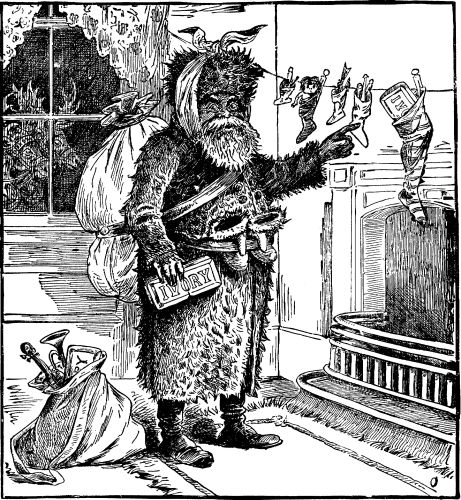
Punctuation errors repaired.
Page 74, extraneous word "a" removed from text. Original read (We must make a way to a)
Page 78, "word" changed to "world" (bit in the world like old)
Page 87, "thoir" changed to "their" (relieve their pent-up)
Page 90, word "the" added to text (the mantel and in)
Page 94, "quils" changed to "quills" (his quills were always)
Page 98, "recieved" changed to "received" (received for wanting to)
Page 99, "Christain" changed to "Christian" (she had come to Christian)
Page 6, advertisements, "are" changed to "care" (care of an aquarium)
Page 8, advertisements, "choolboy" changed to "schoolboy" (of schoolboy life)
Page 9, advertisements, "otherhouse" changed to "other house" (handled by no other house)
End of Project Gutenberg's The Pansy Magazine, January 1886, by Various
*** END OF THIS PROJECT GUTENBERG EBOOK THE PANSY MAGAZINE, JANUARY 1886 ***
***** This file should be named 45266-h.htm or 45266-h.zip *****
This and all associated files of various formats will be found in:
http://www.gutenberg.org/4/5/2/6/45266/
Produced by Emmy, Juliet Sutherland and the Online
Distributed Proofreading Team at http://www.pgdp.net
Updated editions will replace the previous one--the old editions
will be renamed.
Creating the works from public domain print editions means that no
one owns a United States copyright in these works, so the Foundation
(and you!) can copy and distribute it in the United States without
permission and without paying copyright royalties. Special rules,
set forth in the General Terms of Use part of this license, apply to
copying and distributing Project Gutenberg-tm electronic works to
protect the PROJECT GUTENBERG-tm concept and trademark. Project
Gutenberg is a registered trademark, and may not be used if you
charge for the eBooks, unless you receive specific permission. If you
do not charge anything for copies of this eBook, complying with the
rules is very easy. You may use this eBook for nearly any purpose
such as creation of derivative works, reports, performances and
research. They may be modified and printed and given away--you may do
practically ANYTHING with public domain eBooks. Redistribution is
subject to the trademark license, especially commercial
redistribution.
*** START: FULL LICENSE ***
THE FULL PROJECT GUTENBERG LICENSE
PLEASE READ THIS BEFORE YOU DISTRIBUTE OR USE THIS WORK
To protect the Project Gutenberg-tm mission of promoting the free
distribution of electronic works, by using or distributing this work
(or any other work associated in any way with the phrase "Project
Gutenberg"), you agree to comply with all the terms of the Full Project
Gutenberg-tm License available with this file or online at
www.gutenberg.org/license.
Section 1. General Terms of Use and Redistributing Project Gutenberg-tm
electronic works
1.A. By reading or using any part of this Project Gutenberg-tm
electronic work, you indicate that you have read, understand, agree to
and accept all the terms of this license and intellectual property
(trademark/copyright) agreement. If you do not agree to abide by all
the terms of this agreement, you must cease using and return or destroy
all copies of Project Gutenberg-tm electronic works in your possession.
If you paid a fee for obtaining a copy of or access to a Project
Gutenberg-tm electronic work and you do not agree to be bound by the
terms of this agreement, you may obtain a refund from the person or
entity to whom you paid the fee as set forth in paragraph 1.E.8.
1.B. "Project Gutenberg" is a registered trademark. It may only be
used on or associated in any way with an electronic work by people who
agree to be bound by the terms of this agreement. There are a few
things that you can do with most Project Gutenberg-tm electronic works
even without complying with the full terms of this agreement. See
paragraph 1.C below. There are a lot of things you can do with Project
Gutenberg-tm electronic works if you follow the terms of this agreement
and help preserve free future access to Project Gutenberg-tm electronic
works. See paragraph 1.E below.
1.C. The Project Gutenberg Literary Archive Foundation ("the Foundation"
or PGLAF), owns a compilation copyright in the collection of Project
Gutenberg-tm electronic works. Nearly all the individual works in the
collection are in the public domain in the United States. If an
individual work is in the public domain in the United States and you are
located in the United States, we do not claim a right to prevent you from
copying, distributing, performing, displaying or creating derivative
works based on the work as long as all references to Project Gutenberg
are removed. Of course, we hope that you will support the Project
Gutenberg-tm mission of promoting free access to electronic works by
freely sharing Project Gutenberg-tm works in compliance with the terms of
this agreement for keeping the Project Gutenberg-tm name associated with
the work. You can easily comply with the terms of this agreement by
keeping this work in the same format with its attached full Project
Gutenberg-tm License when you share it without charge with others.
1.D. The copyright laws of the place where you are located also govern
what you can do with this work. Copyright laws in most countries are in
a constant state of change. If you are outside the United States, check
the laws of your country in addition to the terms of this agreement
before downloading, copying, displaying, performing, distributing or
creating derivative works based on this work or any other Project
Gutenberg-tm work. The Foundation makes no representations concerning
the copyright status of any work in any country outside the United
States.
1.E. Unless you have removed all references to Project Gutenberg:
1.E.1. The following sentence, with active links to, or other immediate
access to, the full Project Gutenberg-tm License must appear prominently
whenever any copy of a Project Gutenberg-tm work (any work on which the
phrase "Project Gutenberg" appears, or with which the phrase "Project
Gutenberg" is associated) is accessed, displayed, performed, viewed,
copied or distributed:
This eBook is for the use of anyone anywhere at no cost and with
almost no restrictions whatsoever. You may copy it, give it away or
re-use it under the terms of the Project Gutenberg License included
with this eBook or online at www.gutenberg.org
1.E.2. If an individual Project Gutenberg-tm electronic work is derived
from the public domain (does not contain a notice indicating that it is
posted with permission of the copyright holder), the work can be copied
and distributed to anyone in the United States without paying any fees
or charges. If you are redistributing or providing access to a work
with the phrase "Project Gutenberg" associated with or appearing on the
work, you must comply either with the requirements of paragraphs 1.E.1
through 1.E.7 or obtain permission for the use of the work and the
Project Gutenberg-tm trademark as set forth in paragraphs 1.E.8 or
1.E.9.
1.E.3. If an individual Project Gutenberg-tm electronic work is posted
with the permission of the copyright holder, your use and distribution
must comply with both paragraphs 1.E.1 through 1.E.7 and any additional
terms imposed by the copyright holder. Additional terms will be linked
to the Project Gutenberg-tm License for all works posted with the
permission of the copyright holder found at the beginning of this work.
1.E.4. Do not unlink or detach or remove the full Project Gutenberg-tm
License terms from this work, or any files containing a part of this
work or any other work associated with Project Gutenberg-tm.
1.E.5. Do not copy, display, perform, distribute or redistribute this
electronic work, or any part of this electronic work, without
prominently displaying the sentence set forth in paragraph 1.E.1 with
active links or immediate access to the full terms of the Project
Gutenberg-tm License.
1.E.6. You may convert to and distribute this work in any binary,
compressed, marked up, nonproprietary or proprietary form, including any
word processing or hypertext form. However, if you provide access to or
distribute copies of a Project Gutenberg-tm work in a format other than
"Plain Vanilla ASCII" or other format used in the official version
posted on the official Project Gutenberg-tm web site (www.gutenberg.org),
you must, at no additional cost, fee or expense to the user, provide a
copy, a means of exporting a copy, or a means of obtaining a copy upon
request, of the work in its original "Plain Vanilla ASCII" or other
form. Any alternate format must include the full Project Gutenberg-tm
License as specified in paragraph 1.E.1.
1.E.7. Do not charge a fee for access to, viewing, displaying,
performing, copying or distributing any Project Gutenberg-tm works
unless you comply with paragraph 1.E.8 or 1.E.9.
1.E.8. You may charge a reasonable fee for copies of or providing
access to or distributing Project Gutenberg-tm electronic works provided
that
- You pay a royalty fee of 20% of the gross profits you derive from
the use of Project Gutenberg-tm works calculated using the method
you already use to calculate your applicable taxes. The fee is
owed to the owner of the Project Gutenberg-tm trademark, but he
has agreed to donate royalties under this paragraph to the
Project Gutenberg Literary Archive Foundation. Royalty payments
must be paid within 60 days following each date on which you
prepare (or are legally required to prepare) your periodic tax
returns. Royalty payments should be clearly marked as such and
sent to the Project Gutenberg Literary Archive Foundation at the
address specified in Section 4, "Information about donations to
the Project Gutenberg Literary Archive Foundation."
- You provide a full refund of any money paid by a user who notifies
you in writing (or by e-mail) within 30 days of receipt that s/he
does not agree to the terms of the full Project Gutenberg-tm
License. You must require such a user to return or
destroy all copies of the works possessed in a physical medium
and discontinue all use of and all access to other copies of
Project Gutenberg-tm works.
- You provide, in accordance with paragraph 1.F.3, a full refund of any
money paid for a work or a replacement copy, if a defect in the
electronic work is discovered and reported to you within 90 days
of receipt of the work.
- You comply with all other terms of this agreement for free
distribution of Project Gutenberg-tm works.
1.E.9. If you wish to charge a fee or distribute a Project Gutenberg-tm
electronic work or group of works on different terms than are set
forth in this agreement, you must obtain permission in writing from
both the Project Gutenberg Literary Archive Foundation and Michael
Hart, the owner of the Project Gutenberg-tm trademark. Contact the
Foundation as set forth in Section 3 below.
1.F.
1.F.1. Project Gutenberg volunteers and employees expend considerable
effort to identify, do copyright research on, transcribe and proofread
public domain works in creating the Project Gutenberg-tm
collection. Despite these efforts, Project Gutenberg-tm electronic
works, and the medium on which they may be stored, may contain
"Defects," such as, but not limited to, incomplete, inaccurate or
corrupt data, transcription errors, a copyright or other intellectual
property infringement, a defective or damaged disk or other medium, a
computer virus, or computer codes that damage or cannot be read by
your equipment.
1.F.2. LIMITED WARRANTY, DISCLAIMER OF DAMAGES - Except for the "Right
of Replacement or Refund" described in paragraph 1.F.3, the Project
Gutenberg Literary Archive Foundation, the owner of the Project
Gutenberg-tm trademark, and any other party distributing a Project
Gutenberg-tm electronic work under this agreement, disclaim all
liability to you for damages, costs and expenses, including legal
fees. YOU AGREE THAT YOU HAVE NO REMEDIES FOR NEGLIGENCE, STRICT
LIABILITY, BREACH OF WARRANTY OR BREACH OF CONTRACT EXCEPT THOSE
PROVIDED IN PARAGRAPH 1.F.3. YOU AGREE THAT THE FOUNDATION, THE
TRADEMARK OWNER, AND ANY DISTRIBUTOR UNDER THIS AGREEMENT WILL NOT BE
LIABLE TO YOU FOR ACTUAL, DIRECT, INDIRECT, CONSEQUENTIAL, PUNITIVE OR
INCIDENTAL DAMAGES EVEN IF YOU GIVE NOTICE OF THE POSSIBILITY OF SUCH
DAMAGE.
1.F.3. LIMITED RIGHT OF REPLACEMENT OR REFUND - If you discover a
defect in this electronic work within 90 days of receiving it, you can
receive a refund of the money (if any) you paid for it by sending a
written explanation to the person you received the work from. If you
received the work on a physical medium, you must return the medium with
your written explanation. The person or entity that provided you with
the defective work may elect to provide a replacement copy in lieu of a
refund. If you received the work electronically, the person or entity
providing it to you may choose to give you a second opportunity to
receive the work electronically in lieu of a refund. If the second copy
is also defective, you may demand a refund in writing without further
opportunities to fix the problem.
1.F.4. Except for the limited right of replacement or refund set forth
in paragraph 1.F.3, this work is provided to you 'AS-IS', WITH NO OTHER
WARRANTIES OF ANY KIND, EXPRESS OR IMPLIED, INCLUDING BUT NOT LIMITED TO
WARRANTIES OF MERCHANTABILITY OR FITNESS FOR ANY PURPOSE.
1.F.5. Some states do not allow disclaimers of certain implied
warranties or the exclusion or limitation of certain types of damages.
If any disclaimer or limitation set forth in this agreement violates the
law of the state applicable to this agreement, the agreement shall be
interpreted to make the maximum disclaimer or limitation permitted by
the applicable state law. The invalidity or unenforceability of any
provision of this agreement shall not void the remaining provisions.
1.F.6. INDEMNITY - You agree to indemnify and hold the Foundation, the
trademark owner, any agent or employee of the Foundation, anyone
providing copies of Project Gutenberg-tm electronic works in accordance
with this agreement, and any volunteers associated with the production,
promotion and distribution of Project Gutenberg-tm electronic works,
harmless from all liability, costs and expenses, including legal fees,
that arise directly or indirectly from any of the following which you do
or cause to occur: (a) distribution of this or any Project Gutenberg-tm
work, (b) alteration, modification, or additions or deletions to any
Project Gutenberg-tm work, and (c) any Defect you cause.
Section 2. Information about the Mission of Project Gutenberg-tm
Project Gutenberg-tm is synonymous with the free distribution of
electronic works in formats readable by the widest variety of computers
including obsolete, old, middle-aged and new computers. It exists
because of the efforts of hundreds of volunteers and donations from
people in all walks of life.
Volunteers and financial support to provide volunteers with the
assistance they need are critical to reaching Project Gutenberg-tm's
goals and ensuring that the Project Gutenberg-tm collection will
remain freely available for generations to come. In 2001, the Project
Gutenberg Literary Archive Foundation was created to provide a secure
and permanent future for Project Gutenberg-tm and future generations.
To learn more about the Project Gutenberg Literary Archive Foundation
and how your efforts and donations can help, see Sections 3 and 4
and the Foundation information page at www.gutenberg.org
Section 3. Information about the Project Gutenberg Literary Archive
Foundation
The Project Gutenberg Literary Archive Foundation is a non profit
501(c)(3) educational corporation organized under the laws of the
state of Mississippi and granted tax exempt status by the Internal
Revenue Service. The Foundation's EIN or federal tax identification
number is 64-6221541. Contributions to the Project Gutenberg
Literary Archive Foundation are tax deductible to the full extent
permitted by U.S. federal laws and your state's laws.
The Foundation's principal office is located at 4557 Melan Dr. S.
Fairbanks, AK, 99712., but its volunteers and employees are scattered
throughout numerous locations. Its business office is located at 809
North 1500 West, Salt Lake City, UT 84116, (801) 596-1887. Email
contact links and up to date contact information can be found at the
Foundation's web site and official page at www.gutenberg.org/contact
For additional contact information:
Dr. Gregory B. Newby
Chief Executive and Director
gbnewby@pglaf.org
Section 4. Information about Donations to the Project Gutenberg
Literary Archive Foundation
Project Gutenberg-tm depends upon and cannot survive without wide
spread public support and donations to carry out its mission of
increasing the number of public domain and licensed works that can be
freely distributed in machine readable form accessible by the widest
array of equipment including outdated equipment. Many small donations
($1 to $5,000) are particularly important to maintaining tax exempt
status with the IRS.
The Foundation is committed to complying with the laws regulating
charities and charitable donations in all 50 states of the United
States. Compliance requirements are not uniform and it takes a
considerable effort, much paperwork and many fees to meet and keep up
with these requirements. We do not solicit donations in locations
where we have not received written confirmation of compliance. To
SEND DONATIONS or determine the status of compliance for any
particular state visit www.gutenberg.org/donate
While we cannot and do not solicit contributions from states where we
have not met the solicitation requirements, we know of no prohibition
against accepting unsolicited donations from donors in such states who
approach us with offers to donate.
International donations are gratefully accepted, but we cannot make
any statements concerning tax treatment of donations received from
outside the United States. U.S. laws alone swamp our small staff.
Please check the Project Gutenberg Web pages for current donation
methods and addresses. Donations are accepted in a number of other
ways including checks, online payments and credit card donations.
To donate, please visit: www.gutenberg.org/donate
Section 5. General Information About Project Gutenberg-tm electronic
works.
Professor Michael S. Hart was the originator of the Project Gutenberg-tm
concept of a library of electronic works that could be freely shared
with anyone. For forty years, he produced and distributed Project
Gutenberg-tm eBooks with only a loose network of volunteer support.
Project Gutenberg-tm eBooks are often created from several printed
editions, all of which are confirmed as Public Domain in the U.S.
unless a copyright notice is included. Thus, we do not necessarily
keep eBooks in compliance with any particular paper edition.
Most people start at our Web site which has the main PG search facility:
www.gutenberg.org
This Web site includes information about Project Gutenberg-tm,
including how to make donations to the Project Gutenberg Literary
Archive Foundation, how to help produce our new eBooks, and how to
subscribe to our email newsletter to hear about new eBooks.